Tetlow Casts Vision for 2024 and Beyond
By MARYAM BESHARA Editor-in-Chief
For University President Tania Tetlow, her golden retriever Archie — a campus celebrity among Fordham community members — is the ultimate emotional support dog when it comes to the challenges she faces in her position. She shared that she finds herself mulling over upcoming commitments as she takes Archie on a walk.
Having been featured in a profile for The New York Times on Jan. 28, Tetlow has gained attention for her achievements as the first laywoman president at both Loyola University New Orleans and Fordham University, in addition to her former legal career as a prosecutor and her dedication to public service.
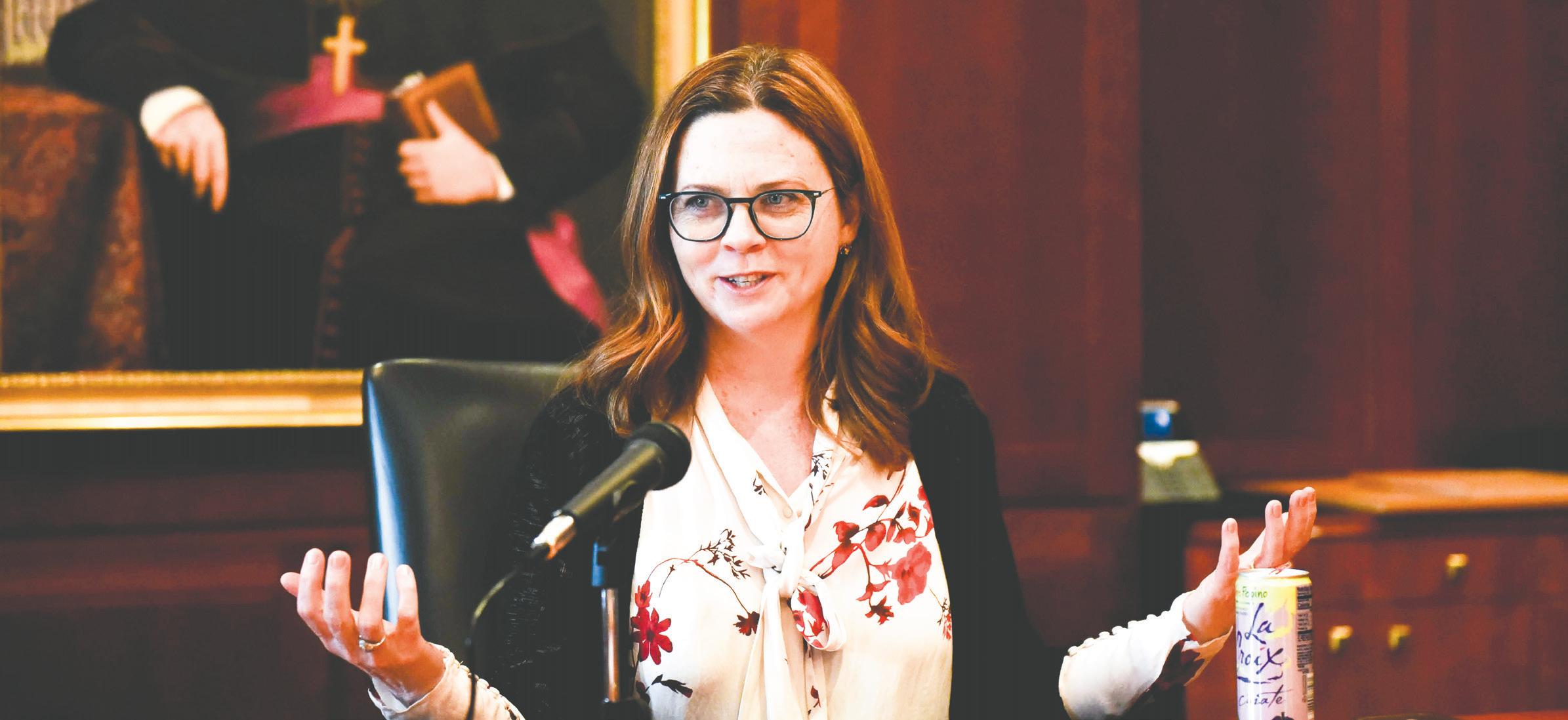
Commuters Criticize Fordham’s Safety Notices
By AMIRA MOTAIR Staff Writer
Amidst the hustle and bustle of New York City’s morning rush, Francesca Alaimo, Fordham College at Lincoln Center (FCLC) ’25, found herself in an unexpected morning commute on her way to her 10 a.m. class. That morning, Alaimo had left home early after registering for her fall 2023 classes. Her journey to school, typically spanning 45 minutes to an hour, hinged precariously on the whims of the day’s crisis on the N train.
On April 12, 2022, just before 8:30 a.m. — around the time the earliest classes at Fordham classes are taught — a man on a crowded N train in Brooklyn tossed two smoke grenades on the floor of one of the cars and shot at civilians
33 times. The New York Times reported that ten people were shot by gunfire, and 13 people suffered injuries because of smoke inhalation, falls or panic attacks.
Approximately two hours after this shooting had taken place, at 11:33 a.m., Fordham’s Department of Public Safety sent out an email that acknowledged police activity on the R, D and N train lines, which led to service suspension at some stations in Brooklyn and Manhattan. Public Safety suggested that students “consider alternate routes and allow for additional travel time.” Despite the severity of the situation, the university declared that it “remains fully open with all classes in session.”
Alaimo was on the N train at around 9 a.m. and was on track to arrive at her classes by
10 a.m. She recalled when her train suddenly stopped underground between stations for almost an hour. Alaimo was left without phone service, and no one else on the train knew what had just happened in Brooklyn.
Her mother saw the news, conscious of her daughter’s commute, which included the N train. While underground, Alaimo could not answer her mother’s repeated phone calls and texts due to not having service. She said her mother almost had a panic attack at work.
Additionally, Alaimo could not email any of her professors that she would be late to class. By the time she arrived on campus around 11:15 a.m., she had missed her entire class.
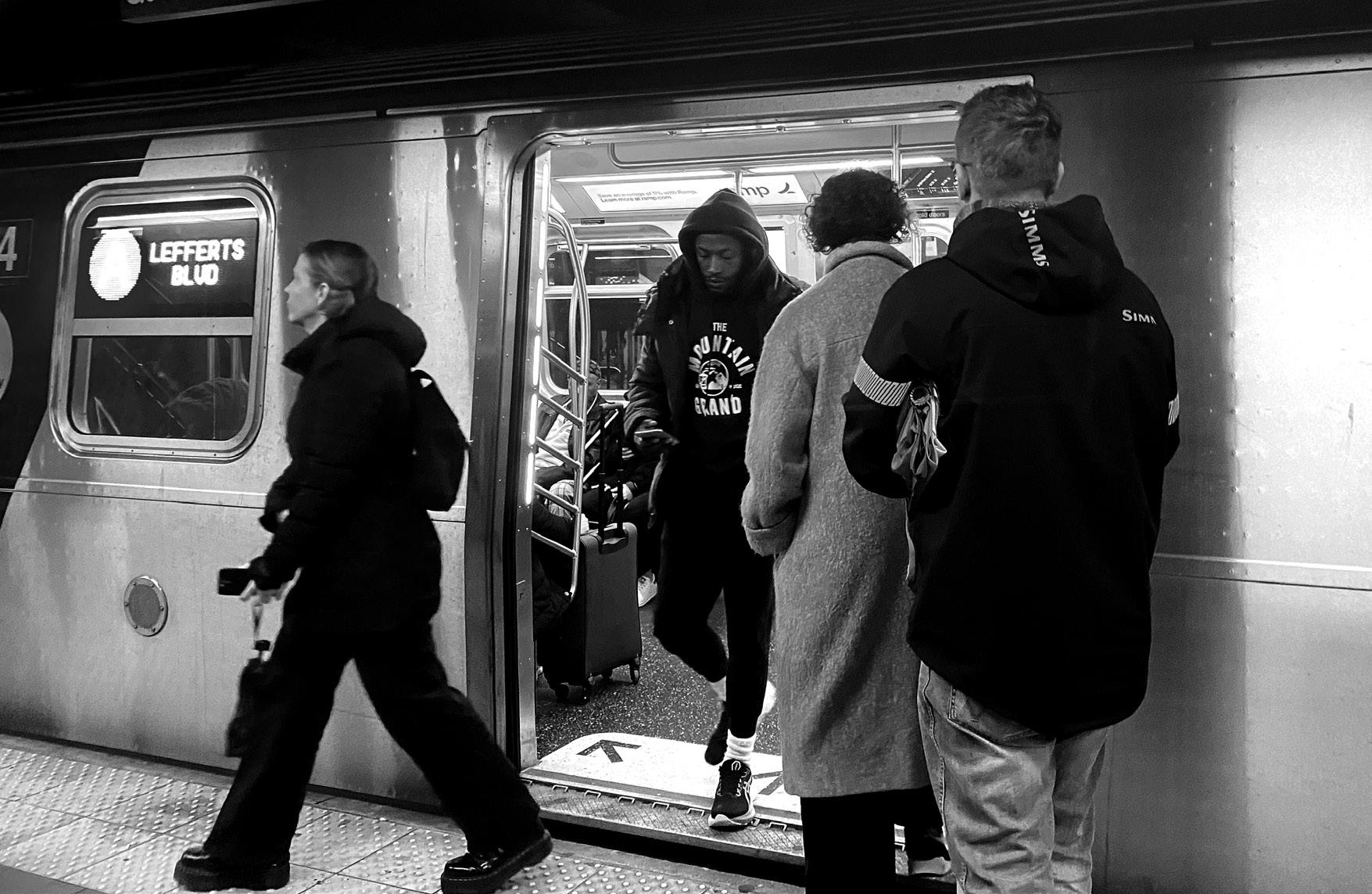
Two Influential Speakers Visit Fordham’s Campuses
• The Black Student Alliance at Ford ham’s Rose Hill campus invited Ilyasah Shabazz, the third daughter of one of the prominent figures of the Civil Rights Movement – Malcolm X. She instilled words of inspiration to the audience in her discussion on Feb. 20. see
• Michelle Alexander, most recognized for her research in her book "The New Jim Crow: Mass Incarceration in the Age of Colorblindness," was hosted by Fordham Law School on Feb. 22 in a moderated discussion about her experience as a civil rights attorney as well as addressing issues of systemic racism.
page 2
see ALEXANDER
NEWS PAGE 3 Fulbright Scholarship Fordham named top producer of recipients OPINIONS PAGE 11 Human Composting The least wasteful way to be laid to rest ARTS & CULTURE PAGE 13 Student Rockette Natalie Butt takes on the Christmas Spectacular CENTERFOLD PAGE 8-9 Grade Inflation Faculty members discuss how they define grading SPORTS & HEALTH PAGE 7 Women’s Basketball Forfeit by Wildcats results in fivegame win streak
see TETLOW page 6 see COMMUTER page 4
SHABAZZ
page 4
COLBY MCCASKILL/THE OBSERVER
Several ideas for capital projects are on the university’s radar, and Tetlow hopes the recent hiring of a director for planning and programming will achieve them.
ANUM ANSARI/THE OBSERVER
Commuters have expressed disapproval with Fordham’s attendance policy, due to its lack of flexibility during times of crisis.
STudenT Voice of fordham LincoLn cenTer Observer February 29, 2024 VOLUME XLIV, ISSUE 3 the
The
New FAFSA Format Delays College Decisions
The new application aims to make postsecondary education more accessible, but the process presented a few hiccups
By MANDIE-BETH CHAU Contributing Writer
Since 1992, students and their parents have anxiously awaited the month of October, the time when the Free Application for Federal Student Aid (FAFSA) becomes available to applicants. Last year, users were met with a notice that the FAFSA application for the 2024-2025 academic year would be delayed and available by Dec. 31, 2023, due to the FAFSA Simplification Act.
The FAFSA is an application that students and their parents can fill out to qualify for federal student aid in the forms of grants, loans and work-study programs. The process was simplified to address rising concerns about the efficiency and fairness of the FAFSA application.
The FAFSA Simplification Act was signed into law in 2020, citing “long-standing concerns” over the applications’ length and complexity, alongside a lack of transparency, and predictability of how the application is used. The law states that these factors may discourage access and attainment of postsecondary educational opportunities. The process was simplified to address rising concerns about the efficiency and fairness of the FAFSA application especially in a digitally literate age and for minority students.
Some major adjustments to the form included replacing the Expected Family Contribution section — information from this section of the application was utilized by college financial aid offices
to determine how much financial aid a student would receive if they were to attend their institution. The financial aid offices then referred to the Student Aid Index, which utilizes a need-based analysis. According to FAFSA’s website, the goal of the simplification is to expand access to Federal Pell Grants, and provide students with a more “streamlined” process.
The simplified form offers a few new benefits to some students from minority or disadvantaged backgrounds. With the new FAFSA format, a student can fill out the form without a parent or guardian’s financial information in certain circumstances such as when a parent is abusive, neglectful, absent or incarcerated. In this case, they will not have to confirm their independent status yearly. This change intends to make higher education more feasible for children whose parents classify into the above categories.
Sabah Hagos, Fordham College Lincoln Center (FCLC) ’25, said that she filed her FAFSA without parental guidance. She expressed that the previous format was very difficult to navigate.
“It was so time consuming, all that work and all the tax documents I had to collect,” Hagos said. “I have entered the form wrong multiple times.”
Urmila Das, FCLC ’25, echoed similar sentiments about students filling out the form incorrectly, and not receiving the correct amount of aid because of it.
“One question that asks about whether you are willing to give
your parents information is worded weirdly. A lot of people made a mistake with that question, and had to get it fixed,” Das said.
Despite soft-launching on Dec. 30, 2023, the FAFSA data will not be available to colleges until March, which will impact the expected timeline for students to receive financial aid offers. Typically, incoming students receive their financial aid offers in the early spring and commit to a school by the end of the spring semester, but this year that process is delayed.
The U.S. Department of Education issued an update on Feb. 20 saying that it is “making further improvements to the Student Aid Index calculation.”
“We’ve adjusted our processing timeline to accommodate these updates, which means we’ll start sending FAFSA information to schools in the first half of March,” the notice said. “Once your schools receive your FAFSA information, they will determine your eligibility for financial aid and create financial aid offers several weeks later.”
This delay in the applications has affected students currently enrolled at Fordham University, as well as many incoming students who typically make their commitment decisions based on financial aid offers.
“There has been a delay in releasing this year’s form, and many families have experienced difficulties in completing the FAFSA since its release,” Brian Ghanoo, associate vice president of the Office of Student Financial Services, said.
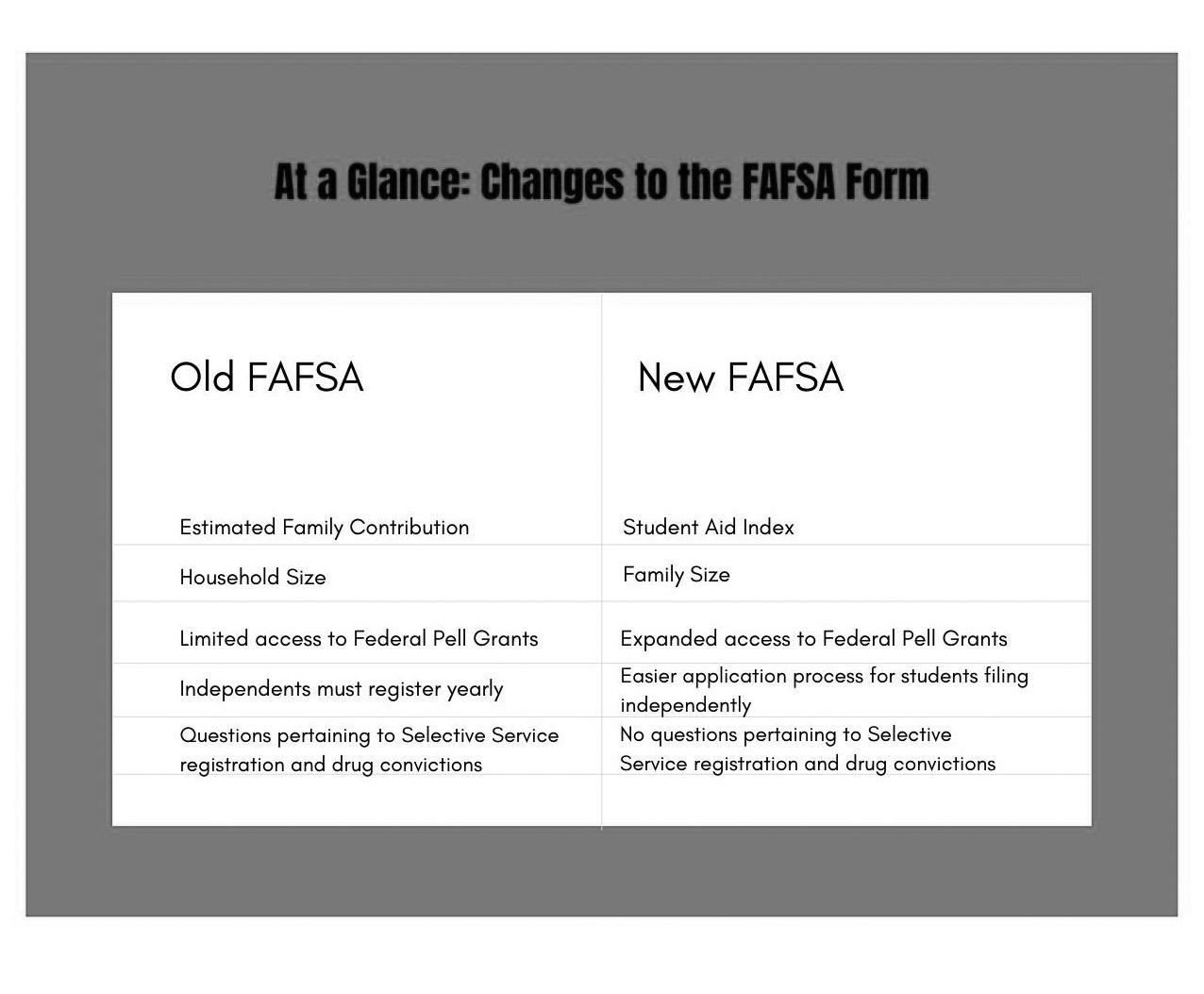
In a student press conference with The Fordham Observer and The Fordham Ram on Feb. 27, University President Tania Tetlow expressed that the delay in FAFSA applications has been “a real tragedy.” She added that the form was utilized to extend tentative packages of financial aid, subject to confirmation from the FAFSA, but that the delay did not halt the distribution of financial aid packages in acceptance letters since Fordham utilized its own supplemental financial aid form.
Ghanoo recommended that families begin completing the FAFSA as early as possible to
accommodate potential delays and issues, and suggested that students monitor the Federal Student Aid web page for FAFSA updates.
“Current students can expect to receive their financial aid offers in mid-to-late June,” Ghanoo said. “Financial aid offers to newly admitted students are being delivered as scheduled based on their Admission Plan.”
The Office of Student Financial Services also created a FAFSA Simplification webpage as a resource for families as they navigate the new process.
Fordham Law Hosts Michelle Alexander
The renowned author discusses her bestselling book, ‘The New Jim Crow,’ about mass incarceration
By MEGAN YERRABELLI Asst. News Editor
Fordham Law School (LAW) hosted its third annual Eunice Carter Lecture Series on Feb. 22. This year’s event consisted of a moderated conversation with Michelle Alexander, American writer and civil rights attorney who is recognized for her book “The New Jim Crow: Mass Incarceration in the Age of Colorblindness.”
Alexis Hoag-Fordjour, assistant professor of law at Brooklyn Law School, and Afrika Owes, LAW ’24, co-moderated the conversation. The event was co-sponsored by the Black Law Students Association; the Center on Race, Law and Justice; the Office of the Chief Diversity Officer; and the Office of the Provost.
Alexander has emerged as a prominent figure in the field of civil rights advocacy. As a renowned legal scholar, she has dedicated her career to addressing systemic racial injustices within the criminal legal system which can be seen in the discoveries she made in “The New Jim Crow.” In her book, she argues that the mass incarceration system in the U.S. functions as a contemporary caste system, systematically relegating Black and brown men to a subordinate status.
Matthew Diller, dean of LAW, initiated the event by introducing Alexander and the co-moderators. Hoag-Fordjou led the first part of the conversation. Her first question prompted Alexander to reflect on her time at Stanford and as a civil rights attorney for the American Civil Liberties Union (ACLU).
“This idea that as a civil
rights lawyer, you can change the world is really intoxicating,” Alexander said. “It’s a very romantic idea, and it kind of casts civil rights lawyers in a heroic role.”
She also discussed how her time representing victims of police brutality made her skeptical about the role of the law in achieving social change.
“I’ve had a series of experiences that prompted my awakening that the system is so much more entrenched,” Alexander said. “We can’t change these systems without accounting for the millions of folks whose voices aren’t heard while civil rights lawyers like me imagine that some isolated victory that revolves around representing the innocent just might have some hope of freeing us all.”
Hoag-Fordjour follows this discussion by asking Alexander about her opinion on “reform and retrenchment” in critical race theory. The phrase refers to the tension between efforts to improve the system through reforms and the simultaneous resistance to those reforms, often resulting in the preservation or exacerbation of existing inequities.
Reform and retrenchment is an element Alexander acknowledges, but she also explains how activists are beginning to identify these cycles and how they take place outside of the U.S.
“Our racial justice movements are inevitably inextricably linked to liberation movements around the world. There are parallels and connections to be made between the liberation struggle posed here in the United States and those in Palestine as well as in other parts of the world, and I see it as a very hopeful moment
that we’re getting to learn each other’s history,” she noted.
Ayanna Alexander, Fordham College Lincoln Center (FCLC) ’26 and an attendee of the Eunice Carter lecture, commented on how Alexander argued that Americans need to adopt a less U.S.-centric idea on racism and look at patterns happening elsewhere around the world. She explained how she would have liked to hear Alexander elaborate on this point.
“In my experience, there are so many people outside of the United States who have trouble conceptualizing the fact that the United States experiences racism today, that something as potent as what she coined as a racial caste system still exists,” she said.
Owes led the second part of the discussion, which included the Q&A section. The co-moderator began by explaining that she was incarcerated at the age of 17 and discussing how community involvement and investment made her case different from most others.
“ You have both the literal shackles and the invisible shackles that come with oppression or incarceration or post-incarceration,” she said.
Building off her experience, Owes asked Alexander how one could bring this community model of lawyering into law school curriculums. The Shriver Center in Chicago defines “community lawyering” as “using legal advocacy to help achieve solutions to community-identified issues in ways that develop local leadership and institutions that can continue to exert power to effect systemic change.”
“Law schools, particularly when it comes to our criminal
in the US
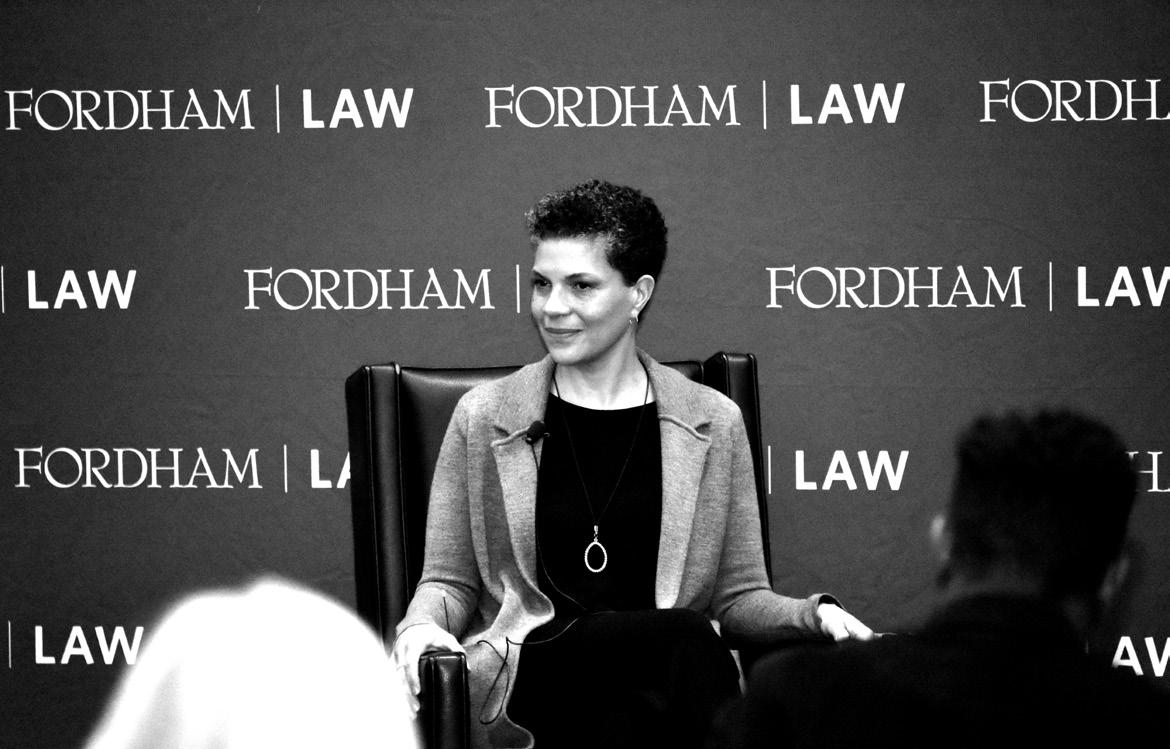
punishment system, need to stop accepting the system as sort of a given and put the system itself on trial in the classroom,” Alexander said.
The final question of the event asked Alexander what keeps her hopeful for future change. Alexander shared that while she had a long period in her career where she felt hopeless, the perseverance and courage of formerly incarcerated individuals kept her going.
“Everything is impermanent. Nothing lasts forever. The American empire will not last forever. So what seeds are we planting?” she said.
Sonya Speizer, FCLC ’24, said that the positive note that the event ended on — specifically Alexander speaking about how an individual can have an impact — was particularly inspiring. “I think we often think of these big structural issues as too large to solve or kind of permanent, so I think that her emphasis on the individual’s ability to
make change stood out to me,” she said.
Liam Hofmeister, LAW ’26, expressed a similar sentiment to Speizer and shared that Alexander’s emphasis on being hopeful for the future despite potential setbacks stuck with him because he has felt similarly discouraged in his work as Alexander did.
“I did direct client services, and it can just be extremely discouraging because you’re, as she mentioned, going up against a system, especially when you’re working with low-income clients,” he said. “Maybe you can get a client a win, but then it's the next day, you have 10 other people who maybe you can’t help because there’s just a lack of resources.”
Alexander concluded the event by imparting some words of wisdom to future activists.
“The short little time that I’m living and breathing here matters, and what we do collectively matters even more, and that gives me hope,” Alexander said.
GRAPHIC ILLUSTRATION BY TARA LENTELL/THE OBSERVER
Financial aid offers will be delayed for college applicants this academic year due to the new FAFSA format.
COURTESY OF FORDHAM LAW
2 News February 29, 2024 THE OBSERVER www .fordhamobserver.com
Alexander discusses systemic racial injustices in the US incarceration system and emphasizes the power of an individual to effect positive change.
State Department Recognizes Fordham as Top Fulbright Producer
In acknowledgment of impressive academic merit and leadership potential, 11 Fordham students and alumni were elected for the Fulbright US Student Program
By GABRIELLA GUTIERREZ Asst. News Editor
The U.S. Department of State announced on Feb. 13 that Fordham University was a top producer of Fulbright Scholarship recipients for the sixth time in 15 years. The prestigious scholarship, which allows students to pursue academic projects internationally, was awarded to 11 Fordham students in the last year, some of whom attended programs in Taiwan, Indonesia, Côte d’Ivoire and more.
“ Fulbright is a cultural exchange, you’re not here to be a teacher of all things to show people how to do their day-to-day lives, but you’re there to learn and to teach at the same time. ”
Eric Schneider, FCLC ’23 and a 2023 Fulbright scholarship recipient
The university was acknowledged for this achievement on Feb. 21 at a reception hosted by the U.S. Department of State’s Bureau of Educational and Cultural Affairs and the Institute of International Education in Washington D.C.
U.S. President Harry Truman established the Fulbright Program in 1946. The initiative was a flagship international educational exchange program sponsored by the U.S. government, providing students grants to expand their studies in one of more than 140 countries worldwide. Students selected can pursue an independent study, partake in graduate studies, teach the English language or participate in a particular program.
In a student press conference with The Fordham Observer and The Fordham Ram on Feb. 27, University President Tania Tetlow noted the life changing impact of these fellowships and awards.
“It was a real focus for Father McShane to do more and more to
help students get the opportunity to get those fellowships and prestigious awards. It’s something I believe in too," she said. "It brings glory to Fordham, but more importantly, it really launches the lives of our students.”
Within the Fulbright U.S. Student Program, students immerse in their host country’s culture and lifestyle, as they engage in direct contact with locals daily. The program aims for students to gain perspectives on international education and opportunity, as well as widening their appreciation of new cultures through their experiences in their host country.
Lorna Ronald, director of the Office of Prestigious Fellowships, said that the awarding of Fulbright scholarships to Fordham students every year reflects that students understand cross-cultural exchange.
“They’ve studied abroad, they’ve served in the local community, they have multicultural family backgrounds and they’ve also had the benefit of a strong core curriculum that teaches them about people different from themselves,” Ronald said.
Ronald added that she encourages students to consider applying to the Fulbright U.S. Student Program, because it is an “amazing” opportunity to expand cross-cultural understanding and overall student success.
“It (Fulbright) sets up students for success in any career which would involve cross-cultural understanding, which is most careers,” Ronald said.
Eric Schneider, Fordham College at Lincoln Center (FCLC) ’23 and a 2023 Fulbright scholarship recipient, was awarded an English teaching assistantship to Côte d’Ivoire for the 2023-24 academic year. His assistantship was an opportunity to expand his interest in French-speaking countries in Africa upon completing his Bachelor of Arts degree in International Studies and French and Francophone Studies.
“Fulbright is a cultural exchange, you’re not here to be a teacher of all things to show people how to do their day-today lives, but you’re there to learn and to teach at the same time,” Schneider said. “And arguably, I would say I’m learning more than I’m teaching.”
The Office of Prestigious Fellowships encourages all Fordham students to apply to the Fulbright Program, regardless of
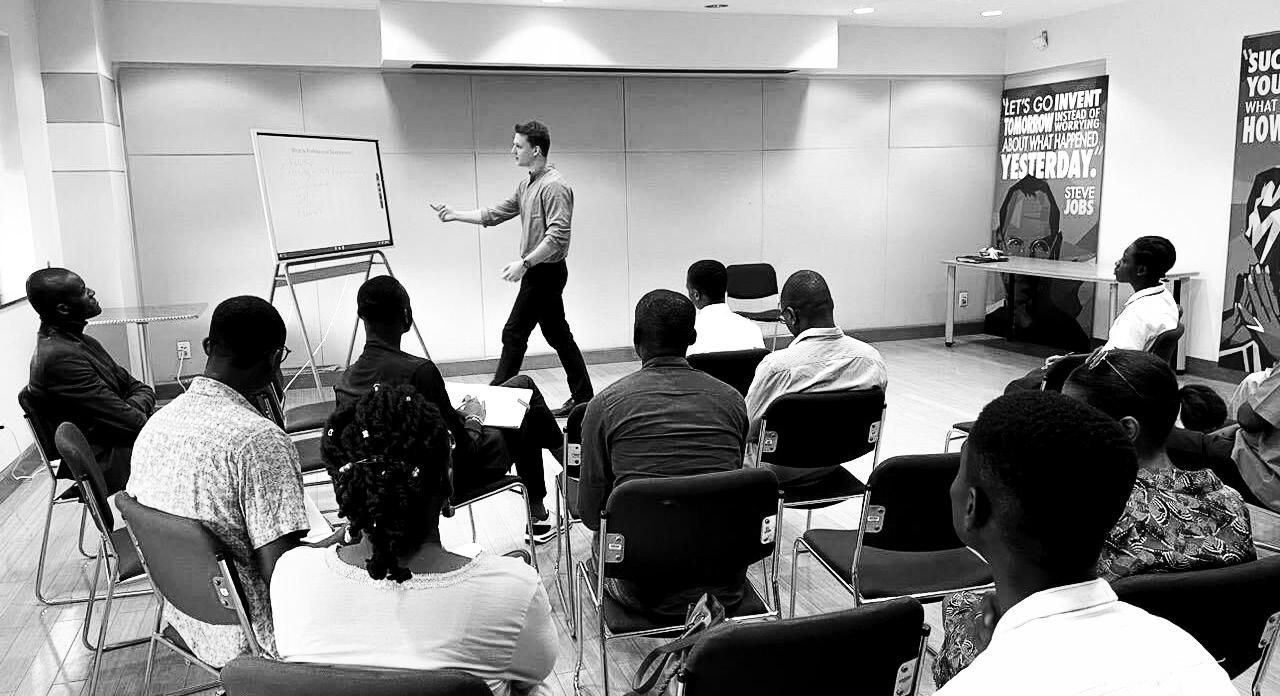
their grade point average or their areas of study. Fulbright applications are accepted until late August yearly.
Marisa Iglesias, associate director of the Office of Prestigious Fellowships, highlighted the Fulbright U.S. Student Program as a chance for students to become involved in a larger movement — an effort that focuses on the expansion of their global circle as well as the student community while abroad.
“Students immersing themselves in another culture really is a life-changing experience and it can open opportunities and new ways of seeing what’s possible, as well as a community of former Fulbrighters that will always be a part of your larger global circle,” Iglesias said.
Schneider echoed Iglesias’ sentiments about Fulbright’s ability to expand the recipient’s global circle.
“This experience has generated a connection that I’m going to have for the rest of my life,” Schneider said. ”This isn’t something that I’m just going to end and say was a great part of my life, but it is something that I really, really plan to continue.”
Iglesias noted that the Office of Prestigious Fellowships works closely with their applicants. Administrators begin meeting with interested applicants early in their junior year as a Fordham undergraduate student to discuss the process of applying for a Fulbright scholarship, which country to study in, and the scholarship

types applicable to them.
Emma Jane Konkoly, FCLC ’23, is a Fulbright scholarship recipient alternate selected as a Teaching Assistant Alternate to Estonia. Konkoly shared that she is grateful to the Office of Prestigious Fellowships for ensuring applicants such as herself are walked through the application process.
Applicants who are selected as an alternate Fulbright scholarship recipient, such as Konkoly, have the opportunity to be promoted to a finalist status should additional funding to the program from the U.S. Congress or the U.S. Department of State be made available.
“They met with me regularly throughout the summer to get to know me because they want to help you advocate for yourself through the Fulbright application process,” Konkoly said.
“ We strive to create space for applicants to explore what they truly want to accomplish on a Fulbright, and the result is an application speaking to the individual applicant. ”
Marisa Iglesias, associate director of the Office of Prestigious Fellowships
After finding a location and program under the Fulbright U.S. Student Program, applicants begin workshopping their essays and applications until the deadline approaches. Following the submission of applications in August, the results of awardees are revealed that May each year.
Konkoly shared that she remembered devoting time to revising application essay drafts which seemed “daunting” at the time, but were manageable under the assistance of Iglesias and Ronald.
“You have to be very logical with your choice of words,” Konkoly said. “You are not going to finish those two essays in a couple of drafts.”
Iglesias discussed the collaborative efforts the Office of Prestigious Fellowships hosts in discovering Fulbright options suitable for their students, in addition to the efforts fostered by previous applicants to the
program. Panels are held featuring faculty members, deans and and members of the university’s administration — some of these members are also involved in the application process in the form of providing feedback and support for students choosing to expand their academic goals.
“It’s truly like a team effort, many are involved and it is amazing,” Iglesias said.
Iglesias described the Fulbright scholarships as one of Fordham’s most popular awards, highlighting its climbing application numbers and continued success for previous student recipients.
According to the Fulbright Program, 42.3% of applicants received the grant during the 2023-2024 academic year, the highest award rate Fordham has achieved in 15 years. The average award rate during this period is 20.9%.
“We're interested in continuing to grow the program so that we have more students applying and with a strong process, this should mean we have more awardees,” Ronald added.
Within the Fulbright Program application itself, the Office of Prestigious Fellowships encourages Fordham students to emphasize their “genuineness” and what they seek to pursue in the program. Genuineness, as expressed by Iglesias, is seen in the application as a reflection of the goals, ambitions and curiosities of the individual student applying to the program.
“We strive to create space for applicants to explore what they truly want to accomplish on a Fulbright, and the result is an application speaking to the individual applicant,” Iglesias said.
While interested students are encouraged to consider their Fulbright applications during their junior year of undergraduate studies, the Office of Prestigious Fellowships has curated several upcoming events in partnership with the Office of Multicultural Affairs (OMA), Residence Hall Association, campus clubs and general information sessions to provide room for discussion on the application process.
An informational session regarding Fulbright with OMA on March 13 at 2 p.m. in the Leon Lowenstein Center South Lounge, in addition to a Zoom with OMA on April 2 at 4 p.m. An additional virtual information session will also be held on April 4 at 4 p.m.
“Fulbright is an opportunity available to everyone,” Iglesias said.
COURTESY OF FORDHAM UNIVERSITY
Eric Schneider, FCLC ’23 and a 2023 Fulbright Scholarship recipiernt, taught in Côte d’Ivoire for the 2023-24 academic year.
COURTESY OF FORDHAM UNIVERSITY
www .fordhamobserver.com THE OBSERVER February 29, 2024 News 3
Fordham is celebrated for its continuous success securing Fulbright Scholarships by the U.S. Department of State.
Ilyasah Shabazz Speaks at Fordham
An author, community activist and Malcolm X’s third daughter, Shabazz spoke about her father’s impact and hope as ASILI’s Black History Month keynote speaker
By ALISON BEINHAUR Contributing Writer
Ilyasah Shabazz, recipient of a master's degree in education and human resource development from Fordham and the daughter of civil rights activist Malcolm X, was invited to be the Black Student Alliance at Rose Hill’s (ASILI) keynote speaker for Black History Month on Feb. 20. Speaking at the Fordham Prep Theater, Shabazz’s discussion was titled “Empowering Voices: A Legacy of Inclusion within the Youth” and focused on a more equal and educated view on Black history.
The event began at 5:45 p.m. Shabazz spoke about the importance of carrying on her father’s legacy and holding onto hope and faith for the future. Her father was a prominent leader of the Civil Rights movement in the 1960s and made significant contributions to the discourse on Black empowerment. He famously advocated for antiracist philosophies, Black autonomy and racial pride.
Shabazz started her speech by specifically illuminating the African lineage that Black History Month celebrates, including “those whose stories have not been properly documented.” She emphasized the strength of the Black community in the modern day in recognition of a long history of overcoming racial subjugation.
“We are strong, we are vigilant, and we are interconnected as a human family,” Shabazz said.
The speech served as a call
to action for students to maintain hope for their future and to remember their purpose in the education system, which she called a cycle where students and educators flow around each other. Her main recommendation to students was to be optimistic throughout their extensive careers.
“It’s important to have hope so our dreams don’t die,” she said.
Jasmyne Blandon, Gabelli School of Business at Lincoln Center ’25, is pursuing a concentration in marketing, and spoke about the importance of Shabazz’s words in the context of student success in the business world.
“ The climate in America was antithetical to the humanity of Black Americans”
Ilyasah Shabazz, Author and Community Activist
“You don’t really see a lot of people of color in my field,” she said. “The hope and dream of being in the business world feels a little too far out sometimes, so her coming to Fordham and speaking about this is important.”
On recognizing Black history in the realm of higher education, Blandon noted that Shabazz’s comments resonated with her.
“We are missing chunks of our history,” Blandon said. “For her
to carry a legacy, I feel like it’s important for other people who don’t even know they’re carrying a legacy.”
Shabazz recounted her experience as the daughter of a high-profile activist during her college years. She mentioned that while the constant negative misconceptions she had heard about her father’s message were “violent” and “too radical” she felt uncomfortable publicly expressing it. This lack of vocal support contributed more to the negative stereotypes regarding X’s image.
“The climate in America was antithetical to the humanity of Black Americans,” Shabazz said.
Despite people telling her mother otherwise, Shabazz says that Malcom X’s image remained alive in their household.
“He was a renaissance man … I knew (him) to be a wise man with impeccable integrity,” Shabazz recalled.
She added that her father played a significant role in forming her values growing up and stressed the importance of knowing who you are and what you deem important.
Students in attendance found it impactful that the speech was delivered by the daughter of a famed Civil Rights activist, especially in connecting present racial and inclusivity issues to past civil rights movements that can seem distant.
“She was raised by these issues and formed her opinions by these issues,” Samuel Scriven, Fordham
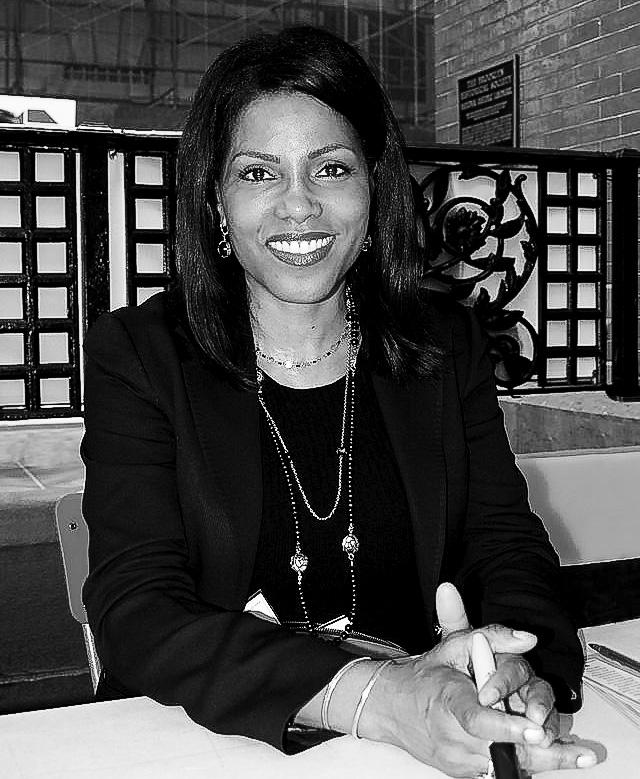
College at Rose Hill ’25, said. “I think it’s valuable to learn lessons and perspectives from somebody who was raised by two very important figures from the civil
rights era.” Blandon added that she wished similar events and speakers were offered year-long, not just during Black History Month.
Rising Tides and Crime: Fordham’s Attendance Policy During Times of Crisis
Commuter students weigh in on the university’s response to holding classes during inclement weather and safety emergencies
COMMUTER from page 1
Alaimo’s absence that day was counted as unexcused. The alternative route encouraged by Public Safety after Alaimo had already gotten to campus had been to walk to the Queensboro Plaza station and to take the 7 to Times Square, eventually transferring onto the 1 train to 59th Street-Columbus Circle or a twenty-minute walk to the R train to 57th Street and 7th Avenue. This is a longer route than Alaimo’s usual journey on the N train, which is right by her house.
On Sept. 29, 2023, Public Safety sent another cautionary email, this time about inclement weather and campus operations to students after New York Gov.r Kathy Hochul declared a state of emergency in New York City due to heavy rainfall and local flooding. In a press release from the governor’s office, Hochul described the flood as a “dangerous, life-threatening storm,” adding that the “water is deadly.” The university remained on a normal schedule, but advised the Fordham community to “exercise caution while walking on campus, and avoid walking near or under large trees.”
This is a reality for many students at Fordham. For commuter students, which account for approximately half of the Fordham community population at Lincoln Center, the moments leading up to classes can be uncertain because the Metropolitan Transit Authority’s (MTA) system can be unreliable, especially during unpredictable weather and other crises.
Students often allocate two to three hours to navigate the
challenges posed by an inconsistent MTA schedule. The situation is exacerbated when New York City experiences unpredictable weather changes or crisis events such as flooding and violence on trains.
Upama Hasan, Gabelli School of Business at Lincoln Center ’26, is a commuter from Jackson Heights, Queens. Hasan described the university’s decision to operate normally to be extremely inconvenient, as transportation from Queens was “minimal and difficult due to the storm.”
She also added that it was “unnecessary” to keep classes in session and that it was “extremely unfair to (commuters) considering that most transportation was not working.” Hasan described residents as having the “luxury” of being unaffected by the storm, and emphasized that the same luxury is not extended to commuter students.
“I was very late to class because I had to find an alternative route,” Hasan said.
Karina Amaach, Fordham College at Lincoln Center ’26, faced similar issues when commuting to class during the Sept. 29 storm. She believes the university’s decision not to shift classes to a virtual modality was upsetting, pointing to the large number of commuters in the student body.
Instead of her usual 40-minute commute from Astoria, Queens to the Lincoln Center campus, it took Amaach an hour and a half because of the delays with the subways and the minimal alternative routes.
Robert Fitzer, associate vice president of Public Safety, said the
university’s call to cancel classes during times of emergency is decided on a “case-by-case” basis following consultation with the Emergency Management Team.
“We considered all factors, including class schedules, driving conditions during the affected times, and the availability of public transportation,” he said. “In many instances, we will not cancel classes, and instructors will be directed to consult with their Academic Deans or department heads to make alternative arrangements such as asynchronous learning or remote classes.”
Jenifer Campbell, dean of students at Lincoln Center, said the scale of the flood on Sept. 29 “wasn’t forecasted for lack of a better word.”
She added that when there is inclement weather, the Emergency Management Team — which is composed of members from Public Safety, Facilities Management Department, the Office of Information Technology, university chief of staff Michael Trerotola, and other members of the Fordham administration — discuss whether classes should be canceled if the weather affects the ability to connect, causes emergency responses or threatens the life of any student or staff on campus.
On the first day of the spring semester, Jan. 16, Public Safety sent out an email to students that all classes before 10 a.m. were canceled due to a forecast of rain and snow. Buses and trains were delayed because of the weather.
Most recently, on Feb. 13, the National Weather Service predicted 5 to 8 inches of snow, high winds, and hazardous road conditions in

New York. All in-person classes were canceled, and some professors chose to have online classes.
Moving forward, Amaach said that administrators “should be overall more considerate for commuter students, especially during inclement weather.”
Amaach believes there should also be at least a 12-hour notice prior to the cancellation of class. She recalled the storm in September when she made the hourand-a-half commute to Fordham only to find out that her class was canceled during her trip. Her other professors also canceled class last minute, leaving her on campus
with nothing to stay for.
Similarly, Alaimo noted that “there’s a lack of flexibility of commuters when it comes to crisis. Sending out a safety email is not helpful, but excused absence flexibility when circumstances out of our control come up is more helpful.”
The tales of Fordham’s commuter students underscore what students describe as a need for increased awareness, as well as support for the significant portion of the university community as they grapple with the unpredictable nature of MTA services and external crises.
COURTESY OFWIKIMEDIA COMMONS Alexander discusses systemic racial injustices in the US incarceration system and emphasizes the power of an individual to effect positive change.
ANUM ANSARI/THE OBSERVER
4 News February 29, 2024 THE OBSERVER www .fordhamobserver.com
The university refers to its Emergency Management Team when determining whether
or not classes should be canceled due to an emergency.
Initiatives Revealed in Semesterly Student Presser
The university president reflected on experiences she had prior to assuming office that have helped shape her desire to be more constructive and discerning
The president spoke with the university’s two undergraduate newspapers: The Fordham Observer, Lincoln Center’s publication, and The Fordham Ram, Rose Hill’s publication, in a student press conference on Feb. 27 that took place in the President’s Dining Room on the 12th Floor of the Leon Lowenstein Center. A wide array of subjects were touched on, ranging from her favorite nearby restaurants to her perspectives on how to navigate painful conversations.
Undergraduate Tuition Costs and Test Optional Policy
At the student press conference with both undergraduate publications on March 1, 2023, Tetlow announced a tuition increase would occur following two academic school years in which tuition had not been raised — later that month on March 30, 2023, the increase was noted to be 6%. At the following student press conference on Nov. 27, 2023, Tetlow added that while the cost of a collegiate education continues to “hit the ceiling for American families,” the university is not aiming to repeat the 6% increase.
According to Justin Bell, vice president for marketing and communications at Fordham, the tuition increase is projected to be announced to members of the Fordham community in midMarch. Tetlow confirmed that the increase in tuition will be “lower than before.”
“We know that the investment in a Fordham education pays off because we see the outputs of the kinds of jobs and careers that come of it — the quality of the graduate programs that you go to, especially our own, all of that,” Tetlow said.
She added that the university acknowledges how “daunting it is to borrow for education,” and although costs have risen alongside the inflation rate, she still refers back to universities hitting the ceiling for what American families can afford.
Tetlow met with members of the House of Representatives and the Senate in early February to discuss strengthening higher education policy, among them being Senate Majority Leader Chuck Schumer, U.S. Representative Ritchie Torres, who represents the Bronx, and U.S. Representative Jerry Nadler, who represents the Upper West Side of Manhattan. She noted that the meeting acted as a reminder that “public support for education opportunity keeps waning, and that is terrible for opportunity in this country.”
When it comes to the test optional policy in admissions, Tetlow noted that Fordham has “no plans to go back to testing in the immediate future.”
“I think that the research on testing being a better predictor of success is contested and mixed, and I think has been oversimplified in some recent coverage,” she said. “We believe strongly that high school GPA and a holistic application review are a better predictor of success.”
Fordham announced that it would be test-optional in May 2020 for a two-year period, leaving it to students to decide whether or not they would like to submit their standardized test scores (SAT or ACT). On Sept. 12, 2022, the policy was extended for another year to include fall 2024 applications, and on Sept. 6, 2023, the policy was extended again to include fall 2025 applications.
On Feb. 22, The New York Times broke the news that Yale University will join Dartmouth
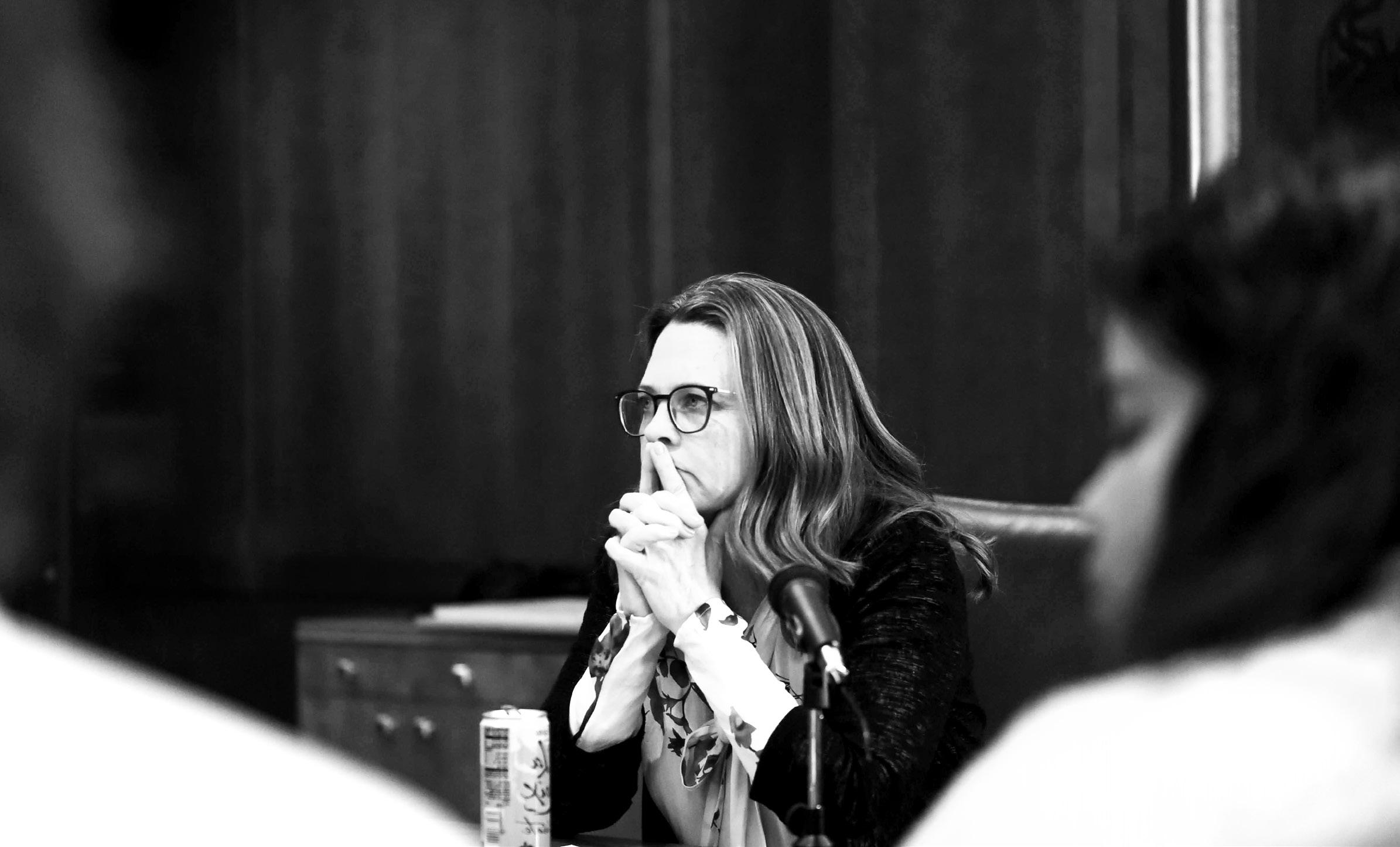
University as another Ivy League to require standardized test scores for the fall 2025 application pool.
The president noted that universities with lower acceptance rates have to take additional factors into consideration, such as standardized test scores, in order to determine which of the students from their applicant pool can be offered admission. Tetlow added that for the university, the priority in admissions is to select the “best and brightest students who will flourish here at Fordham.”
Navigating Freedom of Speech on College Campuses
When three Ivy League presidents faced the House Committee on Education and the Workforce after being called to be questioned about allegations of antisemitism on their college campuses, the conversation of freedom of speech at universities was at the forefront of students, administrators and elected officials alike.
While Claudine Gay and Elizabeth Magill — former presidents of Harvard University and the University of Pennsylvania respectively — resigned from their positions after arguing their cases and standing by their university policies in front of the House. Sally Kornbluth, president of the Massachusetts Institute of Technology, was the other university president questioned at the hearing, but she remains in her position.
While Tetlow shared that she had read about the position of a university president being the most difficult position to occupy in the current state of affairs, she joked about not knowing whether or not to feel a sense of pride or self-pity.
“These were already very complicated jobs and I think it’s very hard to navigate complexity and treacherous ground without misstepping sometimes, as some of my colleagues have done, but the sort of immediacy of consequences to that has felt in some ways — I wonder how much of that is about making higher ed a useful political football right now,” she said.
At the Church of St. Ignatius Loyola on Manhattan’s Upper East Side, Tetlow gave a speech on Feb. 14 to discuss these very topics — “Free Speech and Civility on College Campuses.” In sharing what
she presented from her speech, the president highlighted that a crucial aspect to these debates was regulating the line between academic freedom, protected political speech and threats is “necessary, but very difficult.”
“I did not and do not have all the answers for these issues, but that’s some of what we’re up against,” she said. “I do think that it’s not just a question about what we’re free to yell at each other, it’s also a question of stability and it’s about trying to make a university the opposite of ‘social media land.’”
Tetlow added that she believes the university’s secret weapon is the Jesuit superpower of discernment, which dates back 500 years and, at its core, encourages the assumption of good intentions and being curious and open to other perspectives.
The president said that she intends to send out a communication to students sometime this spring and highlighted that the 2024 U.S. presidential election will also be a moment during which strong emotions will arise globally, leading to an effect at Fordham. She advised students and administrators alike to think proactively about how to make the university a place for passionate debates — ones that don’t “devolve into toxic nonsense.”
In the fall 2023 semester, Tetlow and the university administration expressed a commitment to listening to Palestinian and Jewish students, and invited students to have spaces for discourse. She added that while there have not been any conversations planned for the spring 2024 semester, she would be “eager to console the students who are in a great deal of pain, who are most affected by this war.”
Most importantly to Tetlow was highlighting her difficulty in finding the right words to comfort the student body. She shared that students share a sense of powerlessness in their eagerness for her to help, but finds herself in the embarrassing situation of revealing to them that she has less power than they imagine.
“No one’s really going to be persuaded by anything I could say to change what’s happening over
there,” she said. “But that falls really flat to students who are terrified for loved ones.”
While the president said she is open to having conversations with students, she expressed that she is “not sure they are finding it as helpful as I wish it were.”
Class Sizes and Capital Projects
As of Sept. 27, 2023, the Office of Undergraduate Admissions noted in its report that the current undergraduate class size at Fordham is composed of 10,098 students. Tetlow shared that the university heavily takes into consideration what the optimal class size is when determining any growth, and that it has become harder to predict which students will accept the university’s admissions offer.
“We need to make sure we have enough physical space for you all from housing to dining, to libraries and gyms and recreation and all the rest of it,” she said.
Tetlow highlighted that one of the constraints in growing the undergraduate class size at the Lincoln Center campus is due to the space, noting the elevators in the Leon Lowenstein Center as an example of overcrowding.
Regarding capital projects at the campuses, the university is eager to construct a science building at the Rose Hill campus, with the president adding that it had been a “long time since we invested in more STEM facilities and we have urgent needs.”
According to Tetlow, the university has hired Steven J. Stainbrook as its director for university facilities planning and programming in order to determine the reorganization of some buildings on campus — the relocation of the Office of Disability Services to be more accessible to students being a notable one. She noted that construction costs for capital projects are a major consideration, and that the university is transitioning its focus between the campuses.
Insight from a Former Prosecutor Prior to holding two positions as a university president, Tetlow received her Juris Doctor from Harvard Law School in 1995, and served as a federal prosecutor in Louisiana from 2000-05. She also
shared that she operated a domestic violence clinic at Tulane Law School for 10 years, representing clients in family court.
“I used to read the paper every morning and check first and foremost to see whether any of my clients have been murdered,” she said.
Reflecting on the cases she defended as a federal prosecutor and her time at the domestic violence clinic, Tetlow shared that her experiences provided her with a sense of wanting “not just to function in broken systems but wanting to fix systems and take the time and trouble to make them better.”
She added that she feels an incredible amount of empathy toward people who face all the odds and wants to do the work to improve those odds.
Outside of the Office
In Tetlow’s first student press conference with Fordham’s undergraduate publications on Feb. 23, 2022, she had highlighted her daughter’s, Lucy, desire to be involved with her in the decision-making process.
The president shared that she will sometimes find herself seeking advice from her on work-related matters. As an 11-year-old in the sixth grade, Lucy has taught Fordham’s president tactics on how to win arguments that she found on Google as well as what Tetlow describes to be a “profound” lesson Lucy learned in middle school.
“I remember fuming about something at work,” Tetlow said. “And she said to me, without knowing any of the details, ‘So mommy, you’re gonna have to use your trash can tool’ — meaning just to throw it away, stop worrying about it, — ‘and you may have to use your forgiveness tool even if he doesn’t use his sorry tool.’”
Retrospect will publish a recording of the student press conference with narration in the coming days. Tune in to hear about topics not covered in this piece, ranging from President Tetlow’s take on the campus’ catering service, to her hopes for facilitating on-campus discourse and navigating discussions on the ongoing crisis in Gaza.
Sam Bracy contributed additional reporting to this story.
TETLOW from page 1
COLBY MCCASKILL/THE OBSERVER
Regarding free speech on college campuses, Tetlow noted that the Jesuit superpower of discernment is necessary in having effective conversations with one another.
www .fordhamobserver.com THE OBSERVER February 29, 2024 News 5
Sports & Health
Fordham Rolls to Back-to-Back Wins as Regular Season Winds Down
Fueled by raucous crowds and heroic comebacks, the Rams have found a late-season spark
By CHRIS MURRAY Sports & Health Editor
For the entire season, Keith Urgo, head coach of the men’s basketball team, has called on Fordham students to pack the Rose Hill Gymnasium in support of their fellow Rams. On Friday, Feb. 23, his pleas were met with a spirited student section, which propelled the team to a thrilling victory that night, beating the Duquesne Dukes 79-67.
Just a few nights later on Feb. 27, Fordham rode the wave of momentum into its home matchup against the George Mason University Patriots. A 3-pointer by Kyle Rose, Fordham College at Rose Hill (FCRH) ’24, with 4.0 seconds remaining secured the win for the Rams. They now sit at a 6-9 Atlantic 10 (A10) record, with three regular season games to go before the A10 Men’s Basketball Championship.
“These guys just continue to play, they don’t stop,” Urgo said after the Rams beat the Patriots. “All that we talked about was that they just wanted to not let each other down.”
Friday’s game was significant for three main reasons. First, it was broadcast on ESPN2 — the Rams had not appeared on the secondary channel of “The Worldwide Leader in Sports” since 2008, when they beat the University of Massachusetts
76-72.
Second, the game was designated as a “White Out” promotion, with Fordham Athletics distributing white T-shirts to students. The result of the giveaway was a packed student section, roaring with applause and chants throughout the competition.
“ When you’re playing at home, in front of an environment like that...that doesn’t only affect our own players, it affects them, speeds them up. ”
Keith Urgo, Fordham men’s basketball head coach
Last, there were major implications for the Rams’ positioning in the A10 standings. Entering the game, Fordham’s conference record stood at 4-9, while Duquesne fell just ahead of it with a 6-7 record. The Dukes also beat the Rams earlier in the season, 68-59 on Jan. 27. With the two teams so close in the congested bottom half of the A10 standings, Friday’s game could set the tone for the end of
both teams’ seasons.
Both teams started off slowly on the offensive end, but a spurt of eight consecutive points by Rose to open the game put Fordham ahead 8-4 with 15:09 remaining in the first half. The two teams traded the lead throughout the first half, but it was the Dukes who narrowly edged in front by the halftime break, 32-26.
The Rams emerged with renewed energy for the second half. They opened with a 21-5 run behind a barrage of 3-pointers to build a 10-point lead by the 14:47 mark. The exhilarated Fordham crowd roared as the home team continued its second-half dominance. Ultimately, the Rams outscored their A10 opponent 53-35 in the half on the way to a 12-point victory.
Fordham’s offensive explosion on national television can only be described as uncharacteristic for the squad. The Rams missed only nine shots in the second half, and their 53 points in the half matched Fordham’s point total in their previous game, a 68-53 loss to Davidson College.
Rose shined again for the Rams. He scored 23 points while adding five rebounds, two steals and a block. The performance marked the third time this season that Rose has topped 20 points.
Other major contributors for
the Rams were Antrell Charlton, FCRH ’24, who continued his hot streak with 16 points and 8 assists in his return to the starting lineup, and Abdou Tsimbila, FCRH ’24. Tsimbila finished with 10 points, 6 rebounds and 6 blocks. The dominant victory is especially impressive considering that two of the Rams top scorers entering the game, Japhet Medor, FCRH ’24, and Elijah Gray, FCRH ’26, combined for only four points.
“To the Rose Thrill, the Shirtless Herd, thank you so much … you created so much energy that these guys stepped up,” Urgo noted following the game, gesturing toward Rose and Charlton seated next to him. “When you’re playing at home, in front of an environment like that, and you make a couple of huge plays, the crowd’s going nuts, that doesn’t only affect our own players, it affects them, speeds them up.”
The Rams started the game against George Mason University (GMU) on Feb. 27 even slower than they did in their previous outing. The two teams combined for only 37 points in the first half, with the Patriots entering the break with a 19-18 edge.
This time around, Fordham was not the team to throw the first punch in the second half. George Mason quickly worked to gain the

upper hand, eventually going on a 12-2 run to take a 40-26 lead with 12:22 remaining in the game.
It was at this point that a switch was flipped in the Fordham offense. Over the next eight minutes, the Rams connected on seven 3-pointers and by the 4:44 mark, they had taken a 1-point lead, 52-51.
George Mason refused to cave into the pressure applied by the home team. The Patriots and the Rams traded leads in the final minutes of the game, before the Patriots gained possession with the game knotted at 58 with 48 seconds left.
Their leading scorer, Keyshawn Hall, GMU ’26, drove to the basket, but was stonewalled and forced to take a contested shot. It came up short, but Amari Kelly, GMU ’24, snatched the rebound and tossed a contorted reverse layup through the net with only milliseconds on the shot clock. The air exited the gym as the Patriots took a 60-58 lead.
Fordham called a timeout with 18 seconds remaining to gather its thoughts. The ensuing play centered around a handoff to Rose, who connected on three 3-pointers in the second half, for a go-ahead shot from behind the arc. He missed, but the Rams fought for the offensive rebound, tying the ball up and forcing a jump ball.
Luckily, Fordham maintained possession. The ball was tossed in to Rose, who set his feet behind the three-point line once again and rose to shoot in front of Fordham’s bench. He didn’t make the same mistake twice, and with 4 seconds on the clock, the Rams took a 61-60 lead.
The crowd erupted as Fordham completed its 14-point comeback. Rose finished with 16 points in addition to the game-winner, while Will Richardson, FCRH ’26, and Romad Dean, FCRH ’26, added 10 points apiece. Tsimbila contributed another solid effort defensively, securing 9 rebounds and blocking four shots — he is now only 0.1 blocks per game behind the leader of the A10 for the season.
With only a handful of games left, victories such as these can shift the tides of the entire conference.
Importantly, both Duquesne and George Mason sit in front of them in the A10 standings. With only a handful of games left in the regular season, victories such as these can shift the tides of the entire conference.
Specifically, the Rams hope to secure the ninth slot or better in the A10 Championship. They currently sit at 10th in the league, but rising one spot would secure a bye to the second round of the tournament.
A win against St. Joseph’s University in Philadelphia on Mar. 2 would go a long way in supporting their cause, as the Hawks are exactly one game ahead of the Rams with a 7-8 A10 record. Needless to say, the men’s basketball team could not have chosen a better time to find momentum, as Urgo’s squad is less than two weeks away from the first games of the A10 Championship.
COURTESY OF FORDHAM ATHLETICS/THE OBSERVER
Kyle Rose, FCRH ’24, has caught fire for the Rams. Fordham’s all-time leader in games played is averaging 15.5 points over his last four games.
Sports & Health Editor Chris Murray February 29, 2024 THE OBSERVER
Women’s Basketball Hits Sixth Winning Streak
The Rams defeated the A10-leading Saint Joseph’s Hawks in a thrilling victory and are now on a roll in the waning weeks of the regular season
By AURELIEN CLAVAUD Asst. Sports & Health Editor
In a shocking performance, the Fordham women’s basketball team took down the Saint Joseph’s University Hawks, 62-57 on Wednesday, Feb. 28. The Hawks opened the game atop the Atlantic 10 (A10) standings with a 14-2 conference record. The Rams, on the other hand, were well rested and amply prepared to face the top conference program — their previous scheduled game on Feb. 21 against Davidson College was forfeited by the Wildcats due to a lack of players. According to Fordham Athletics, a non-COVID-19 related health and safety protocol kept the Wildcats from suiting up on Saturday.
It was this bizarre stroke of luck that may have contributed to the remarkable turnaround for the Rams, whose previous contest against the Hawks ended in a blowout on Dec. 30, 2023 with a score of 76-49. In what was its first conference game of the season, Saint Joseph’s delivered its second largest A10 win of the year, topped only by its 60-29 dismantling of LaSalle University on Feb. 18.
For the Rams, however, defeating the Hawks ensures that the seeding for the A10 Championship will not be resolved until the final week. The Hawks had little to lose, but the Rams now stand tied with three other teams in seventh place, all grappling for a coveted bye in the upcoming A10 tournament.
Entering this pivotal matchup, the Rams — aside from their technical win on Saturday — earned four hard-fought victories over the last three weeks. From Feb. 7-21, Fordham outscored its opponents 283-210. In every game, the Rams won by a margin of 14 or more.
Starting against the University of Dayton Flyers on Feb. 7, Fordham leaned on consistent shooting at
a high volume, nailing 44% of its field goals to Dayton’s 33%.
It was a solid night for Emy Hayford, Graduate School of Arts and Science ’24, who topped the box score with 16 points. The Dutch transfer from the University of Pittsburgh has been second in scoring on the Rams this season averaging 12 points per game.The Dayton game was remarkable as the Rams did not give up the lead once, finishing the game up 22 points, 70-48.
Against the University of Massachusetts (UMass) on Feb. 10, Hayford continued to show off her scoring acumen, putting up 17 points and knocking down three of five from beyond the arc. Forward Taylor Donaldson, FCRH ’24 and a transfer from New Mexico State, tallied a double-double to the tune of 16 points and 10 rebounds.
The contest against UMass was lopsided, as the Rams went on multiple scoring runs, at one point scoring 14 unanswered points. By the end of the half, Fordham was up 38-17. In the fourth quarter, UMass snuck up with a mild 12-point run of their own, but it was too little, too late, and the Rams closed out 64-50 to take their second win in a row.
Following this, Fordham went on the road and took on the St. Bonaventure University Bonnies in an even less contested game. It was, to put it lightly, a total blowout, with the Rams putting up 70 points to the Bonnies’ 48. The matchup completed the season sweep for Fordham, as it beat St. Bonaventure on Jan. 3 earlier this season, 65-57 — a much closer affair.
The Bonnies fought during the first half, despite the Rams jumping to a 10-point lead in the first quarter. In the second half, however, the Rams were up 20, and the game was essentially over. With three wins down, Fordham was on a roll.
Finally, on Feb. 21, the Rams

marched confidently home to Rose Hill and took down the Saint Louis University Billikens, 79-64. Hayford once again led the team in scoring, notching 22 points, while Donaldson added 21 to go along with 8 rebounds. Together, they scored more points than the rest of the Rams combined. Truly a dangerous duo on the court, the two are largely responsible for the Rams’ recent successes.
Saint Louis challenged the Rams in the first quarter, but by the second quarter the Billikens had quieted, and Fordham pulled away. In the second half, Fordham worked its way in the paint as its 3-pointers found nothing but iron — Donaldson weaved through the defense, and by the end of the final period, Fordham had extended its winning streak to four.
Saturday came and went, and then finally, the Rams matched up against the Hawks. The game was a grueling back and forth contest.
The lead changed 4 times in the first half, and another four times in the second. Donaldson once again led the Rams in scoring, scoring 18 including a go-ahead 3-pointer in the final minute of the 4th quarter. Fordham worked its way into the paint the whole game, slashing its way to 40 points near the basket, and wearing down Saint Joseph’s defense, eventually reaching their largest, albeit brief, lead of 8 points midway through the third quarter.
In the fourth quarter, the game took on new intensity and in the final minute, Fordham pulled away with a floater from the top of the key by Taya Davis, FCRH ’25. A graceful corner three by Donaldson off of an inbound pass gave Fordham a two point lead with 31 seconds left, before tenacious defense and two free throws by Davis iced the game. The clock rang and the Rams celebrated. Their win streak now at six, it was a refreshing moment after a tough beginning
to the year. Forhdam lost 11 of 12 games from December to late January, including several crucial conference matchups.
Nothing compares to a team down on its luck finally turning it around. Fans were surely exhilarated by the victory over the Hawks, and with just one game now until the conference championship tournament, it is a confidence boost for the Rams to get revenge on the Hawks.
The Rams will close out the season when they come home to Rose Hill on March 2 to play La Salle University, and more importantly, celebrate the seniors on Senior Day. The A10 Women’s Basketball Championship will be held from March 6-10. Although there may be serious doubts regarding the Rams’ championship aspirations, Fordham has proven in these final weeks that it can face adversity with grace and confidence.
UMass Leaves A10 Fordham Baseball’s Rocky Start
The Atlantic 10 (A10) conference, founded in 1976, is losing one of three remaining founding members. On Monday, Feb. 26, the Mid Atlantic Conference announced that its board had voted for the University of Massachusetts at Amherst (UMass) as its new member, as first reported by The Athletic. For nearly 50 years UMass was a staple of the conference. In 1996, the UMass men’s basketball team advanced all the way to the Final Four of the NCAA Tournament.
Recently, despite its long history as a pillar of A10 men’s basketball, UMass has struggled to produce results. They are currently fifth in the A10 with a 9-7 record, and in the last five years, they have sat at the bottom of the table aside from a moderately successful 2020-21 campaign. The women’s team is faring no better, at the moment they are second to last with a 2-16 conference record and 4-26 for the season. Other UMass sports have done decently, with the hockey team winning the NCAA title in 2021, but they compete in the Hockey East rather than the A10 and will reportedly remain there amidst the realignment.
As for the reasoning, UMass has made it clear that it wants to compete in football, and part of seeking a new conference was to find itself a Football Bowl Series (FBS) aligned conference.
“Massachusetts has been very transparent with the Atlantic 10 in its search for an FBS conference affiliation,” A10 Commissioner Bernadette McGlade said in an official statement. “In turn the A-10 has been very respectful of this need and the environment needed surrounding FBS football.” However, for powerhouse sports such as basketball, the season isn’t over yet and UMass is still in competition. For the time being the A10 remains as exciting as ever.
Moving forward, McGlade doesn’t expect a change in the atmosphere. “This news does not alter the mission of the A-10 as a nationally relevant successful basketball-centric conference,” McGlade said. For UMass, glory awaits in the FBS. For the rest of the A10, it remains to be seen whether further realignment is on the horizon.
The Fordham baseball team has begun its 2024 season, but not as many had hoped. The Rams have lost five of their first seven games, beating only Army West Point and Saint Peter’s University. The season opened with a challenging matchup. Fordham traveled to Winston Salem, North Carolina, to take on the top-ranked team in the country, Wake Forest University.
The Rams took an early 1-0 lead, but the Demon Deacons quickly pulled ahead and emerged with a 9-3 victory. Since then, Fordham has lost to the University of Akron, the University of Illinois, the University of Maine and Stetson University.
In its home opener on Wednesday, Feb. 28, the Rams defeated the Saint Peter’s Peacocks. Fordham rolled to a 13-8 win in rainy weather behind an eight run explosion in the 7th inning. Six different pitchers appeared in the game for the Rams, with Andres Perez, Fordham College at Rose Hill ’25, earning the first win of his career.
Fordham has been outscored 57 to 14 in losses this season, underlining a streak of uncompetitive play. The Rams entered the season predicted to finish 10th in the Atlantic 10 (A10) by the annual preseason poll conducted by A10 coaches.
Next up for Fordham is a trip to South Carolina for a three game series against Wofford College. Now sitting at 2-6, they will look to continue their upward trajectory as they prepare for the conference schedule beginning in late March.
COURTESY OF FORDHAM ATHLETICS/THE OBSERVER
Emy Hayford looks to pass during a game against UMass. Hayford knocked down three 3-pointers in that contest.
www .fordhamobserver.com THE OBSERVER February 29, 2024 Sports & Health 7
Making the Grade
What are grades for? The Observer spoke with faculty, administrators and students about the shifting landscape of grading at Fordham. While some fear an upward trend in overall GPAs will cheapen student success, others have welcomed the chance to reduce pressure on students to achieve higher grades. Can such a central facet of education be transformed?
By SAM BRACY Staff Writer
Easy A? Report: Student grades trend upward
Student grade point averages (GPA) at Fordham College Lincoln at Center (FCLC) have trended upward in the past 10 years, according to data from a grade analysis report produced by Fordham’s Department of Information Technology during the fall 2023 semester.
The rise in GPAs matches the nationwide “grade inflation” trend at colleges and universities, where students are earning higher marks on average. In the spring 2023 semester, Fordham students earned just below a 3.5 GPA on average, only one decimal point from the Dean’s List academic distinction.
Some members of Fordham’s community argued that rising GPAs are symptomatic of falling standards for college students, while others expressed that concern over grade inflation demonstrates how gradebased evaluations are structurally unfair.
Robert Moniot, associate dean for FCLC and chair of the Committee on Academic Progress, said that the rise in overall GPA suggests some professors are less rigorous in their assessments of students.
“One of the things about
the grade inflation is that it cheapens the higher grades,” he said. “So if a lot of students are getting A’s, it suggests that the faculty member is not challenging the students.”
Moniot noted that grades are an imperfect measure of student learning, and often reflect external circumstances rather than a student’s academic performance. However, he believes the integrity of grades should be preserved as they remain important for admission decisions for post-graduate programs.
Some professors see rigorous grading as a professor’s responsibility to their students. Rosemary Wakeman, a history professor at Fordham’s Lincoln Center campus, said it is important to reserve A’s for a handful of submissions that demonstrate an extra level of research and analysis. She compared giving everyone A’s to not giving grades at all.
“It’s my responsibility as a professor who is supposed to be an expert in a field to provide steady information, a theoretical framework, but it’s the student’s responsibility to do the reading and to
do the studying required as part of the learning process,” Wakeman said. “There’s no way for me to assess that without grades.”
Mary Bly, an English professor and chair of Fordham University’s English department, said that higher grades on average are not necessarily a problem. Bly described grades as a tool to encourage students to study more closely and grow academically.
“I figure the better teacher I am, the more A’s I’m going to get,” Bly said.
Both Bly and Moniot shared that they were aware of classes at Fordham in which every student received an A, including students who did not attend a single class throughout the semester.
These situations suggest that some professors automatically award students with A’s at the end of the semester without regard for their performance in the class. Bly made particular note that these instances are very rare, and may occur when faculty members experience burnout.
Job insecurity may also impact the decisions professors make while grading.
Representatives of Fordham Faculty United (FFU), the union representing the university’s non-tenure track faculty, suggested that some professors are afraid that giving strict grades could jeopardize their position.
Cornelius Collins, an adjunct English instructor and a chief steward of FFU, said some professors will give higher grades to avoid conflict with students. Faculty can be fired for any reason in their first two years at Fordham, and Collins said a formal complaint about a grade could compromise their jobs.
“In this probationary period of employment instructors might be hesitant to get into any kind of conflict with a student who might complain so they might be giving a higher grade in that case because they feel they might not have the support of the department,” Collins said.
Bly believes that erroneous grade complaints, or course grade appeals, should not threaten a professor’s position.
“Grade complaints, we get a tremendous amount of them. And they do not make
any difference in terms of whether we rehire someone,” Bly said. “We also get grade complaints that are really, grounded in reality, and we deal with those in a different way.”
Beyond course grade appeals, which consists of a grievance procedure, Moniot added that some faculty have expressed concerns that enrollment in their classes could dip if they are branded as a strict grader on popular websites such as ratemyprofessors.com.
“That’s definitely a valid concern,” he said. “They want to get good evaluations and have students flocking to their classes.”
Moniot added that students should assign less importance to grades and instead use their time at Fordham to learn new things in subjects they aren’t familiar with.
“The emphasis should be on learning,” he said. “I would like to see that sort of attitude grow amongst our students, that they aren’t so concerned about taking a course that’s in their comfort zones so that they can get an A rather than taking a course that might challenge them.”

3.7 3.1 2.9 3.3 3.5 Semester Average GPA
Against Grading
“Ungrading” movement explores for fairer ways to grade
Some members of Fordham’s faculty have criticized the system of grading as an ineffective measure of comprehension which requires professors to unfairly rank students against one another.
the work required to earn the grade they’ve chosen.


Many “ungraders” argue that letter grades foster an academic hierarchy contraty to the spirit of education.
While Fordham professors must assign a letter grade to their students, advocates for “ungrading” try to de-emphasize them in the classroom. These professors grade assignments for completion or adapt criteria for success to match the growth of individual students, in addition to other alternative methods of assessment.
Many “ungraders” argue that letter grades foster an academic hierarchy con trary to the spirit of educa tion. Diane Detournay, an advanced lecturer in the English department at Ford ham Lincoln Center, criti cized the idea that students receiving more A’s on aver age cheapens academic per formance.
“That is a view of excel lence that actually necessi tates the failure of a certain subgroup, and that doesn’t seem right to me,” she said.
Lauren Romeo, Fordham College at Rose Hill ’24, has taken three classes taught by Detournay and praised her approach to grading. Romeo noted that she is more motivated by Detournay’s grading system than large lectures and exams that make up significant portions of a class grade for her major in Biology. The STEM courses she has taken are often graded on a curve, where student’s grades are established according to a predetermined ratio where the majority of students will fall in the middle B/C range.
“There’s nothing I can do to actually really improve this,” Romeo said. “It’s just really weird and really frustrating.”
Romeo referred to introductory STEM lectures graded on a harsh curve
especially in core classes and STEM courses. For students who struggle to perform well on tests, the importance of these exams can make them feel left behind.
Alessia Valfredini, a senior lecturer of Italian at Fordham Lincoln Center, allows her students to retake tests for full credit and keeps flexible deadlines for assign ments. She said that she does not penalize students for late work because learn ing, rather than grades, mat ters most.
“I want to acknowledge that there’s multiple ways to walk that path and they’re all meaningful,” Valfredili said. “How come we’re just using outcome measures that are so short sighted, when the things we’re the most proud of happen after more time, and manifests themselves in context?”

Detournay strives to take grades off her stu dents’ minds so they have the freedom to pursue their interests. In her classes, Detournay uses a “speci fications grading” system where students set the grade they want to receive and how much work they want to complete to earn it. That way, Detournay said, stu dents can clearly understand
“ How come we’re just using outcome measures that are so short sighted, when the things we’re the most proud of happen after more time, and manifests themselves in context?”
Alessia Valfredini, Senior Lecturer of Italian


“Ungraders” like Detour nay and Valfredili acknowl edged that grades cannot be abolished without a broad upheaval across academia. For now, they will explore possibilities to teach around grades in ways that nurture the passion and imagination of their students.


















Are grades helping students learn? Or are they just a means to an end?


BY TARA LENTELL
Human Composting: A Green Way to Return to the Earth
A natural burial is good for the planet and lets you be reborn as a part of nature
 HONORAH BROZIO Contributing Writer
HONORAH BROZIO Contributing Writer
When someone dies, they can be put in the ground or an urn — but many are unaware that there is an alternative that returns the body to the earth in a natural way. Instead of traditional burial or cremation, there is human composting, which honors the natural cycle of life and creates a memorial specific to our loved ones without harming the earth.
Human composting is a simple process that lays the body on a bed of wood chips, alfalfa and straw. The body decomposes and turns into fresh usable soil in five to seven weeks. According to the human composting facility, Recompose, one human turns into about one truck bed of soil which can be used for a garden, tree or even spread among a forest.
Why is human composting better than traditional embalming or cremation practices? It is important to consider the average postmortem process. One day a man named Body dies. Body hangs out with the mortician who pumps him full of embalming fluids, drains his blood, removes his organs and creates a chemically preserved thing that is not natural, not human and definitely not Body.
The work involved in
the embalming process is not natural for a human to experience and it exposes the mortician to harmful chemicals. The National Funeral Directors Association claims that embalmers inhale high levels of formaldehyde and are at risk for coughing, nausea, facial irritation and, in some cases, leukemia.
After the preparation, Body’s family picks out a casket, plans a ceremony, buys enough flowers to start a flower shop and buys a plot of land. So, is it worth it? Is it worth it to expose morticians to harmful chemicals and waste resources for a process that attempts to slow decomposition and maintain a body that is no longer alive?
Modern funeral practices involve cement vaults and caskets in order to preserve our loved ones for as long as possible. We delay the decomposition process for about a decade so that our bodies resemble canned goods in the bottom of a cement bunker. We waste time, thousands of dollars and land all because we want to look at our loved ones and imagine they’re still alive. When I think about modern death practices I wonder, why do we ignore death when we can embrace it?
Human composting is the opposite of traditional burial. With human composting, our bodies replenish the earth, not take from it. The process allows us to be among the
trees or a meadow where we will forever contribute to the circle of life.
The possibilities of soil are endless. When I die, I want to become a carrot patch. With human composting, you could be a lemon tree or a tulip garden, and your family could make a garden and sit under the shade of your tree.
You are not a preserved lump at the bottom of a cement vault or a pile of ashes on the mantel. Rather, you would nourish the roots of your favorite plant and your family would be with you, laying under the sun.
Each individual is capable of changing the way we see death. After all, America’s extravagant funeral practices and embalming methods are relatively modern. The Library of Congress associates America’s booming death care industry with the Civil War because families wanted their loved ones preserved and returned from war. Embalming remained popular after the success of President Abraham Lincoln’s embalmed body during his lavish funeral tour. If luxurious funerals and embalming were influenced by societal changes, I believe human composting can reach the same degree of acceptance someday.
Moreover, human composting is crucial to the future of our planet. In 2019, the Population Reference

Bureau notes that roughly 3 million Americans died. Typically, more than half of the population chooses cremation and the rest choose traditional burial meaning millions of people harm the earth for funerals on an annual basis.
Recompose claimed on their website that:
“Cremation burns fossil fuels and emits carbon dioxide … Conventional burial consumes valuable urban land, pollutes the soil, and contributes to climate change through resource-intensive manufacture and transport of caskets, headstones, and grave liners.”
Earth Funeral, a human composting company in New York, shared similar data claiming one cremation produces about 535 pounds of CO2. While cremation saves land resources, it usually involves burning embalmed bodies which releases toxic chemicals into the air.
Unfortunately, human composting is only legal in seven states including Washington state, Colorado, Oregon, Vermont, California, Nevada and New York. Even then, there are only a handful of human composting facilities in the country. Earth Funeral is accessible for people in New York, but if someone from Texas wanted to be composted they would have to transport the body all the way to a different state with a facility.
The U.S. needs to legalize human composting in all 50 states because everyone should have the option to decay. I find it ridiculous that America’s legal burial options harm the earth but natural decomposition is illegal in 43 states. We’re allowed to be preserved and burned but not returned to the earth. We’re allowed to kill the planet but not help it.
Everyone can help promote human composting. It’s easy to spread awareness by sharing websites such as Recompose or Earth Funeral with your friends and family. Additionally, you can follow Recompose’s legislative tracker, a resource that updates visitors on which states are in the process of legalizing human composting.
By destigmatizing environmentally friendly burial options, we can move away from harmful burial choices and make decomposition a common burial practice. Normalizing human composting starts with the small steps of educating our peers until the knowledge reaches the legislature. Instead of scarring the earth, we can return to it.
POLICIES AND PROCEDURES No part of The Observer may be reprinted or reproduced without the expressed written consent of The Observer board. Letters to the Editor should be typed and sent to The Observer, Fordham University, 140 West 62nd Street, Room G32, New York, NY 10023, or emailed to editor@fordhamobserver.com. Length should not exceed 200 words. All letters must be signed and include contact information, official titles and year of graduation (if applicable) for verification. If submitters fail to include this information, the editorial board will do so at its own discretion. The Observer has the right to withhold any submissions from publication and will not consider more than two letters from the same individual on one topic. The Observer reserves the right to edit all letters and submissions for content, clarity and length. Opinions articles and commentaries represent the view of their authors. These articles are in no way the views held by the editorial board of The Observer or Fordham University. The Editorial is the opinion held by a majority of The Observer’s editorial board. The Editorial does not necessarily reflect the views held by Fordham University. To reach an editor by e-mail, visit www.fordhamobserver.com The Observer is published on alternate Wednesdays during the academic year. Printed by Five Star Printing, Flushing, N.Y. Observer the Editor-in-Chief Maryam Beshara Online Editor Quincy Reyes Creative Director Tara Lentell Layout Editor Giada Evangelista Head Copy Editors Smile Butt Grace Ehle Asst. Copy Editors Emily Davis Leeya Azemoun News Editors Insiya Gandhi Alexa Villatoro Asst. News Editors Stevie Fusco Gabriella Gutierrez Megan Yerrabelli Sports and Health Editor Chris Murray Asst. Sports & Health Editor Aurelien Clavaud Opinions Editors Jake Eraca Matthias Lai Asst. Opinions Editors Avery Grafeld Ana Winston Arts & Culture Editors Aditi Praveen Kariyanahalli Avery Loftis Asst. Arts & Culture Editors Julia Jaramillo Juliana Sharon Features Editors Lola Cravath Madeleine Signore Asst. Features Editors Caroline Sensenig Colby McCaskill Fun & Games Editor Abby Grunzinger Asst. Fun & Games Editors Damian Grove Jasmine White Social Media Editors Eeshita Wade Shelby Williams Asst. Social Media Editor Sofia Strelnikova Multimedia Editors Lauren Bocalan Asst. Multimedia Editors Riley Kraus
Host Morgan Johnson
Producers Nellie Podokshik Sukriti Varma Editorial Adviser Richard Rosen Visual Adviser Hamidreza Nassiri
Podcast
Podcast
GRAPHIC
BY
HONORAH BROZIO/THE OBSERVER
to help the
Opinions Opinions Editors Jake Eraca Matthias Lai February 29, 2024 THE OBSERVER
Human composting turns death into an opportunity
planet heal
Manhattan is Home to the Best Bookstores in NYC
From places with large collections to specialized shops, there are many great local bookstores for bookworms at Fordham Lincoln
Center

Every semester, most college students have to purchase textbooks or books for their courses. As tiresome as that process may be, it can also be a fun experience when a bookstore has the right atmosphere. If you are a bookworm like me, then you’ll enjoy being surrounded by the vast array of books of all genres that bookstores have to offer. Without further ado, here are some of my favorite bookstores in New York City.
Shakespeare & Co.
For Fordham students, Shakespeare and Company is a bookstore that may ring a bell. Originating in Paris, France in 1951, Shakespeare & Co. is bringing in the Lost Generation — the Americans who came of age around World War One — back into the limelight by highlighting writers such as F. Scott Fitzgerald and Ernest Hemingway. Now, this store has locations in New York City, with being a short 10 minute walk from Fordham Lincoln Center on the corner of West 69th Street and Broadway, and the other a short 15 minute crosstown bus ride to the east side.
Shakespeare & Co. has multiple shelves of fiction and non-fiction books, among other genres. The location I’ve frequented often is the east side location, on Lexington Avenue just across from Hunter College.
There is also a cafe located in the store which fills the bookstore with the aroma of coffee and baked goods, the perfect scent to sit you down for a book-reading session, perhaps accompanied by a warm drink.
Out of sight in the basement, there is also a huge supply of art materials such as canvases, paintbrushes, paints and more. If you are an arts and crafts person who
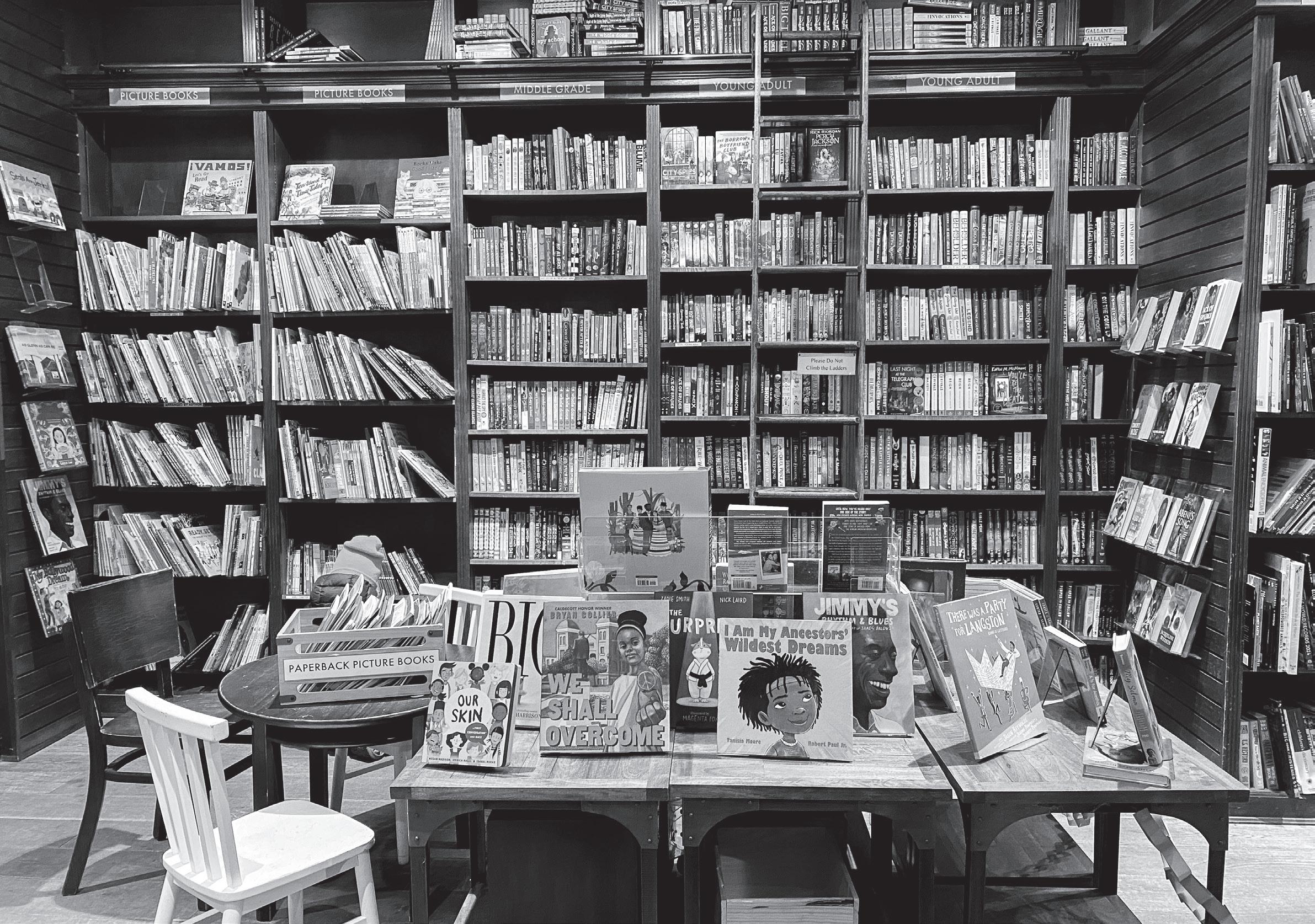
also likes to read, then the east side store will definitely appeal to you.
Albertine Bookstore
French speakers or those interested in French literature should visit Albertine Bookstore, located on Fifth Avenue and 79th Street. This is, by far, the prettiest bookstore that I have seen, with its ceiling painted in a deep royal blue to represent the galaxy and golden stars glistening at every turn. The bookstore has over
14,000 contemporary and classic titles in French and English, which makes Albertine an amazing source for broadening your studies in French.
Albertine is a two-story building and it is a little compact, but this space is what makes the atmosphere intimate as you shop for your desired books. The lighting is also dim and it truly captures the essence of the beautiful ceiling, under which reading can feel surreal.
The Drama Book Shop Theater students at FLC are recognized for their contributions and dedication to the school’s widely known drama program. This talent can be honed by visiting the Drama Book Shop at Eighth Avenue and 39th Street, which is a short 10-minute subway ride away from Fordham’s Lincoln Center Campus.
This independent bookstore features a wide variety of plays, scripts and musicals, as well as

books on those formats, which can be helpful for theater students and fans of theater alike. Even if you’re not into drama, you should still take a trip to see the amazing floating book installation throughout the shop.
Lin Manuel Miranda, the creator of “Hamilton” and other popular musicals, is a patron of this store, which was designed by David Korins, the scenic designer for “Hamilton.” If you swing by to have a look at the beautiful interior design as well as browse through the hundreds of books, you might just catch a glimpse of Miranda as well.
The Strand Bookstore
The Strand Bookstore is an independent bookstore with its main branch in the East Village, as well as several other locations throughout Manhattan and one in Queens. The store boasts a collection of 18 miles of books for sale and has a diverse selection of used and new books, so you can be sure to find everything you need at affordable prices.
Beyond its massive collection, The Strand also has a cafe and a whole section of literary gifts at the main location for you and your loved ones. From totes to hoodies to mugs, this store has it all. Come for a cup of coffee and a quick read and consider buying a gift from the bookstore on your way out.
Books are food for the mind and it is important to read once in a while to enrich ourselves with new information. Whether it be a quick read about a love story or a philosophical dissertation on Plato’s “Allegory of the Cave,” reading will always be beneficial to us. These bookstores are sure to help you find what you’re looking for as well as provide additional amenities. From the huge variety of books in the Strand and Shakespeare and Co. to the specialized collections available at Albertine and the Drama Book Shop, at least one of these locations will appeal to your exquisite taste.
ANUM ANSARI/THE OBSERVER
Shakespeare & Co. has multiple locations throughout Manhattan with cafes and a versatile collection of books.
MOSA ADIBA Contributing Writer
ANUM ANSARI/THE OBSERVER
www .fordhamobserver.com THE OBSERVER February 29, 2024 Opinions 11
Albertine Bookstore may be the most beautiful book shop in New York, with its ceiling painted like a starry night sky and over 14,000 titles in French and English available fo sale.
BookTokers: Braggarts, Not Bookworms
Videos on ‘BookTok’ revamp antiquated prejudices about classics and oversimplify reading
 WILLIAM LEE Contributing Writer
WILLIAM LEE Contributing Writer
One of my consistent loves — even throughout my teenage years — has been that of reading. The educational potential of reading can allow escape without a dopamine overdose. Storytelling through literature provides a slower pace and requires the presence of the mind, making reading a pleasant complement to the addictive aura of social media.
Great stories can introduce readers to unfamiliar perspectives and deepen their understanding of life at large, meaning anyone can enjoy reading in some capacity. When browsing social media, I unfortunately see people pretending that reading makes you more intelligent instead of taking the time to engage with the material itself.
Literature has an important and meaningful role in life, and seeing others use reading to fuel contests of ego strikes a particularly sore spot for me. Reading is not a lifestyle choice for the few, but a pleasure for many.
Simply put, contemporary online discourse and the perception of reading is awful.
Clout-chasing and the overclassification of books by their content cloud what would otherwise be a fun space online. An especially insidious trend perpetuated by “BookTokers” (self-proclaimed fans of literature on TikTok) is the reduction of reading to categories — people recommending classics because they have a certain trope or they are a certain “core,”
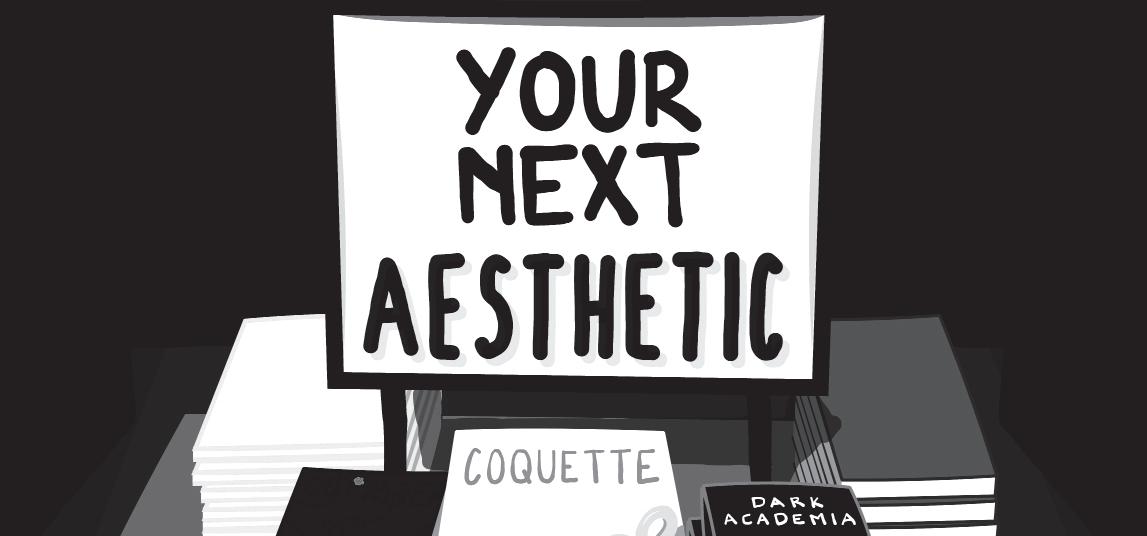
a suffix used in online spaces to denote a certain aesthetic.
While recognizing tropes, especially in the Western canon, can be entertaining, calling Vladimir Nabokov’s controversial novel “Lolita” ‘coquette’ is painful. ‘Coquette’ is not a trope present in the text, but an aesthetic category formed by the creator. “Lolita” features the grooming of a minor by an adult man and is not a story to be romanticized or glamorized; videos aestheticizing the book obscure the gravity of the story and turn the act of reading into a status symbol. Posts such as the ones about “Lolita” are unserious. Discussing books in that way completely divorces talk from the unique good found in each book. Stories deserve far more consideration beyond their fit into a given adjective.
Repressing the insatiable desire to classify material into simplified categories will be key for enjoyment of media in general in the future, especially books. Let literature and movies stand on their own terms. Atomizing reactions to books when discussing them limit their potential and any discourse around them.
Although stories have commonalities, the wide array of books available to readers are not machines made of standard parts. The form of a story is equally, if not more important, than the content, or its “aesthetic.”
Love stories have been around for millennia, but they still entertain and enlighten readers today. Authors and audiences alike should feel free from the immediate desire to group everything together hyper-specifically into “aesthetics,” “cores” and so on.
At least think about specific reasons why you might recommend a book to your friend before making a video about how it’s ‘cottagecore.’ Alongside grouping books by “cores,” people capitalize on the “classic” status of certain books to be perceived as literary and uniquely educated. Obviously, people have been elitist since well before TikTok, making this new iteration all the more disappointing.
Fyodor Dostoevsky should be loved for more than his books’ supposed “dark academia” aesthetics. “Dark academia” is a descriptive phrase that references the style and habits of white elites at prestigious universities. It evokes the distinguished air of Harvard University or Oxford University, Gothic architecture, and the fashion choices of
students and professors — lots of tweed, leather briefcases, etc. Dostoevsky, an author so famous for harrowing introspection and poignant social commentary — such as Ivan’s monologue on his philosophical struggles with loving others in “The Brothers Karamazov” — would hate the vacuous performances of fandom for him.
It is clear that chauvinism and snobbery about classic books and the Western canon has been repackaged online. TikTokers have picked up where good old analog prejudice left off, using books such as “The Picture of Dorian Gray” or “The Brothers Karamazov” to signal their intelligence and willingness to annotate.
By recommending the same books traditionally prioritized in famous Western universities, “BookTokers” perpetuate the othering effects of canon discourse. Reading functions as a status marker: The greatest books are read by the smartest people, who all dress a certain way and have niche tastes.
Reading cannot be turned into yet another lane in the rat race. The books that I choose to read are not inherently better than yours. The only sure quantities in reading are its value to personal development and learning of all kinds. Reading more and reading differently can open new intellectual horizons.
More books — in good faith — can only help. I earnestly hope that people can leave behind discourses of exclusion in 2024 and enjoy books for what they are.
GRAPHIC BY JASON BONNER/THE OBSERVER
12 Opinions February 29, 2024 THE OBSERVER www .fordhamobserver.com
“BookTok” ruins the discourse around classic literature by reducing timeless novels to trendy aesthetics
Arts & Culture
Ailey Student Seals Second Season as New York City Rockette
Natalie Butt, FCLC ’24, reflects on her experience with Radio City Music Hall’s Christmas Spectacular and her approaching senior graduation
By GABRIELLA GUTIERREZ Asst. News Editor
Natalie Butt’s, Fordham College at Lincoln Center (FCLC) ’24, winter job is a 90-year-old tradition, one in which she welcomes the holiday magic and the flock of New York City tourists visiting the Christmas scene through the art of dancing in back-to-back shows at Radio City Music Hall as a Rockette.
Butt has had a chance to live her dream starring in the Christmas Spectacular for the second holiday season in a row, with the 2023-24 season concluding in early January 2024. Following her time as a Rockette, she plans to complete her undergraduate studies and graduate this May at the Ailey/Fordham BFA program.
The Christmas Spectacular opened in 1933 and has become a staple holiday-must for both New York City tourists and residents from late November to early January. The 90-minute show includes the Rockettes, skaters, musicians, singers and even Santa Claus himself. Featuring 40 Rockettes per show, their high kicks, pointed toes, precise movements, quick costume changes and intricate choreography are what draw crowds to Radio City.
Full-Time Student, FullTime Dancer
Butt chose to pursue her education in dance at The Ailey School (Ailey) since her enrollment at Fordham in fall 2020 — this came during a time when students nationwide were receiving a synchronous education remotely as a result of the COVID-19 pandemic. With her drive and dedication to dance, she overlooked the challenges of balancing online classes and in-person rehearsals to expand her dancing abilities.
The graduating senior has made strides in her dance career at Ailey, working with choreographers such as Shannon Lewis, Dylan Pearce and Candi Boyd on various dance projects.
Butt expressed gratitude toward Ailey for giving her the flexibility in transferring her rehearsals as a Rockette to school credits. Due to her
responsibilities as a full-time student at the Ailey/Fordham BFA program and as a Rockette, striking a balance was crucial.
“The Ailey School has been very helpful in a way where that I am not having to come in and have my dance classes on top of my Rockette rehearsals, as Rockette rehearsals can be intense,” she said. “Rehearsals last six days a week for six weeks and six hours a day.”
With not attending Ailey dance classes during performance season, Butt felt relieved taking a short break from school to focus on being a part of the Spectacular. She has now returned to her rehearsals and classes at Ailey full-time, and is on track to graduate.
Training as a Rockette and balancing her studies, Butt specifically recalls the support from her photography professor accommodating her schedule from her first season as a Rockette. She was granted her independent study, where the pair would then meet outside of class hours up to twice a week.
“ As an athlete, it definitely needs to require a mix of physical and mental self-care, ”
Natalie Butt, Fordham College at Lincoln Center ’24
“I would do all of the work for that class after rehearsals or after shows, and with that, I was able to get credit for the fall 2023 semester,” Butt said.
The separation of the types of work has helped Butt ease transitioning from a full-time dancer to a student, in maintaining a balance between work as a Rockette and as a student. While Butt felt she created a balance by “switching gears” on assignments for school, she enjoyed the intersection of “behind the scenes” work in taking photos as a Rockette for class projects.

From Miami to Manhattan
Born in Michigan and raised in Miami, Butt began dance classes at age four after her parents decided that her young spirit and connection to music was worth the decision to enroll her in dance classes.
“We need to put this kid in dance classes,” Butt’s parents decided. “And from there, the rest is history,” Butt remembers in reminiscing about her parent’s decision to enroll her in classes.
As a young dancer at TAME Dance Academy in Florida, Butt excelled in her dance classes before attending a performing arts high school, New World School of the Arts. Butt achieved the distinction and merit of being a member of the National Honors Society for Dance Arts.
Although Butt recalls not having the opportunity to travel to New York City during the holidays to see the Radio City Music Hall’s Christmas Spectacular, she was mesmerized by their
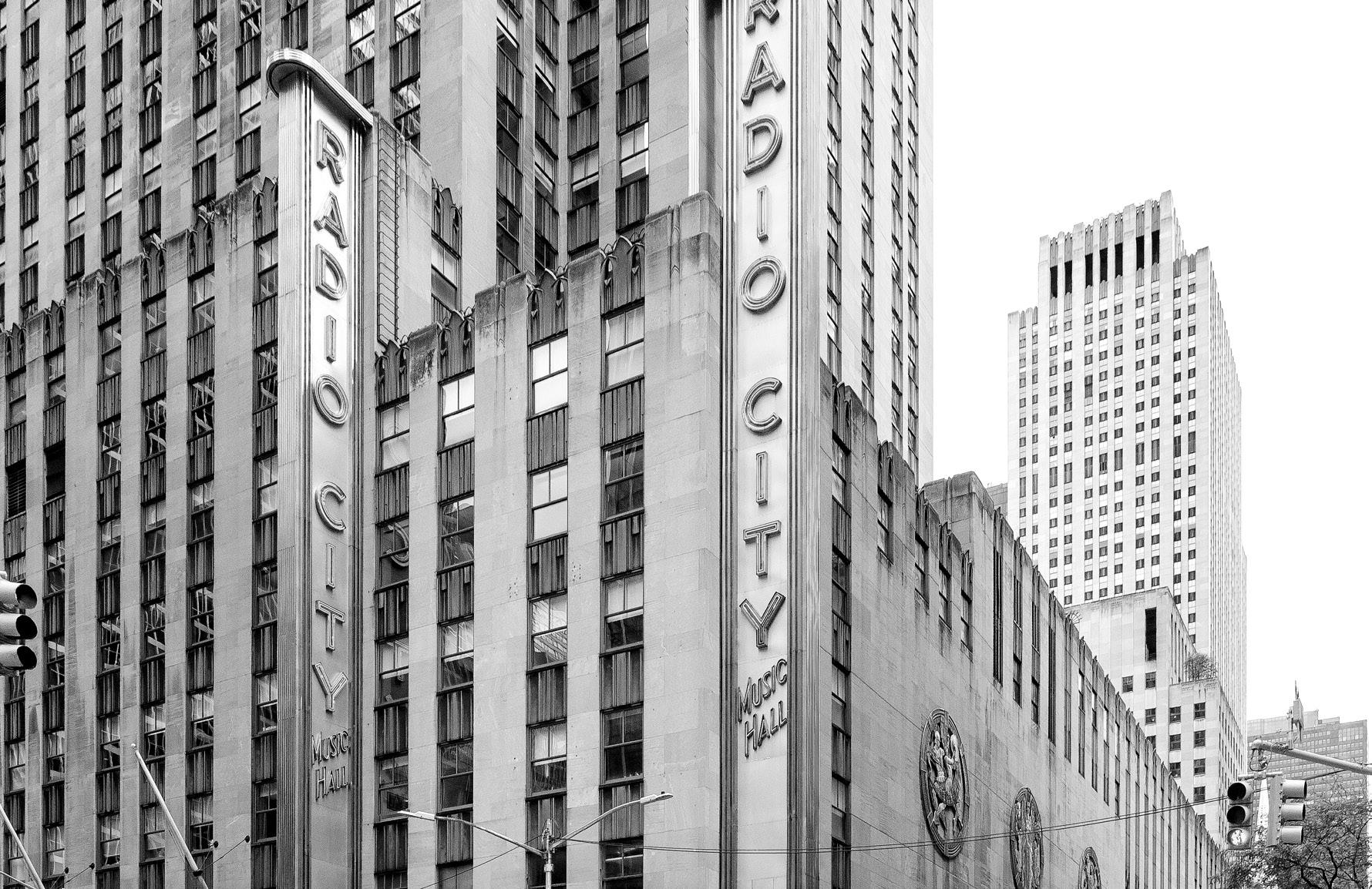
televised performances on the Macy’s Thanksgiving Day Parade and the “Today Show” each year.
“ It still feels like a dream every day to have performed at Radio City Music Hall. ”
Natalie Butt, Fordham College at Lincoln Center ’24
“It kind of just seemed like becoming a Rockette was this far-fetched dream for me because I was not in New York and I did not have access to that type of training,” Butt said. Butt then began to inch toward this dream when she became a dancer in the Ailey/ Fordham BFA program.
Nearing the end of her high school career, Butt knew she wanted to soon dance in the city.
She saw the Ailey/Fordham BFA program at the top of her list upon applying to colleges.
“Fordham was absolutely my top choice of school,” Butt said. She considers herself fortunate to train at the Ailey School with their dancers and staff, while living in Manhattan.
The Show Must Go On
Butt is now a part of the Rockette’s morning cast, which means she has reported to Radio City Music Hall for plenty of early mornings where she spent additional time clearing her mind and physically warming up. Either meditating or enjoying the walk to work, she enters with a clear mind as the day begins. Butt was sure to fuel herself with proper nutrition before beginning up to four shows in a day.
“As an athlete, it definitely needs to require a mix of physical and mental self-care,” Butt said.
Butt described her self-care as being able to take rests when needed, as well as taking advantage of the Rockettes’ Athletic Training Department no matter the size of a possible injury. Butt
said she made it a point to never leave Radio City without an ice bath, often followed by a warm shower and rolling out her muscles.
Butt continued to describe her self-care as embracing quiet time whether it be watching a Christmas movie before bed to calm herself or to prepare for another day of Rockette duties.
“Since we’re doing so many shows in a day, it can be very overstimulating and just a lot of excitement and so for me, personally, I always want to make sure I am getting enough rest to wake up the next morning and do it all again,” Butt said.
A Dream and Tradition in One
As a holiday tradition, the Christmas Spectacular includes ever-changing elements that keep audiences of thousands upon thousands on the edge of their seats. Butt is confident these yearly modifications of production engage their audiences to continue fostering “Christmas spirit” after leaving Radio City Music Hall.
“We have our number, Dance of the Frost Fairies, where you experience immersive magic with drones flying around in the audience while the Rockettes are dancing on stage,” Butt said. The drones are a small piece of elements fused with the shows’ familiar yearly tradition. “This year we have even more drones than ever before.”
Butt believes the combination of tradition with today’s elements, is what allows her to love her job as a Rockette more with the coming holiday seasons.
Performing for thousands of audience members each season, Butt is grateful for the opportunity to be a part of many family’s Christmas traditions in seeing the Rockettes nearing the holidays.
“It’s a tradition combined with excitement in bringing the show to the stage, and everyone loves a holiday tradition, especially the Radio City Christmas Spectacular,” Butt said. “It still feels like a dream every day to have performed at Radio City Music Hall.”
Caroline Sensenig contributed reporting on this story.
COURTESY OF WIKIMEDIA COMMONS
Once dismissed as a “far-fetched dream,” Butt says she hopes her tenure as a Rockette brings joy to New Yorker’s holiday traditions.
COURTESY OF WIKIMEDIA COMMONS
From balancing schoolwork to dancing for the Radio City Rockettes, Natalie Butt shares her experience managing her busy but rewarding schedule.
Arts & Culture Editor Aditi Praveen Kariyanahalli Avery Loftis February 29, 2024 THE OBSERVER
Grand Bazaar NYC: A Philanthropic Flea Market
The oldest flea market in New York City reflects its unique talents a few blocks from Fordham Lincoln Center
By SARAH SULLIVAN Contributing Writer
Among the plethora of pop-ups and flea markets in New York City lies the charming and community-oriented Grand Bazaar NYC. Tucked in the nook behind MS M247 Dual Language Middle School on the corner of West 77th and Columbus Avenue, this eye-catching Upper West Side market features hundreds of artisans, up-and-coming food entrepreneurs and reputable independent vintage and antique dealers, resulting in a vibrant shopping experience. The weekly market takes place every Sunday, finishing with a whopping 51 open days in a year.
Founded in 1979 by neighborhood parents to raise money for their children’s public school education, all profits from the market are given back to the community, helping to support four local public schools. Grand Bazaar NYC is not only the oldest flea market in the city, but the most dedicated to its community. The structure of the market benefits all local shoppers, sellers and over two thousand public school students alike.
The market takes up roughly 43,000 square feet of indoor and outdoor space, with additional vendors lining the block outside. Once you maneuver through the thick crowds and maze of booths, however, hidden gems are aplenty and the vendors are just as interesting as their pieces.
Dina, a vendor at the market who preferred not to share her last name, owns a small business called Vintage-O-Rama. She has been a vendor at this flea market for two years now and resides in the neighborhood, close to the Fordham Lincoln Center campus. Her booth displayed a large variety of reworked vintage jewelry, which she takes a lot of pride in.
“My favorite part of the bazaar is seeing everyone’s own pieces,” Dina said. She added that they give her inspiration to continue her work. Dina loves the Grand Bazaar NYC predominantly for the fact it “supports the schools, and provided me the opportunity to continue selling jewelry after the craft store I used to work at went out of business.”
Apart from the unique vintage jewelry and clothing items, there are treasure troves of assorted antique collectibles and knick-knacks to sort through. Kim Bryant is the owner of one of these bric-à-brac booths. His collection spans from antique tea spoons to license plates, in a seemingly endless spread.
“I have been collecting for years and years, but most pieces seem to find me now,” he said.
Bryant attends various estate sales, auctions and consignment shops, with pickers all over the area to curate his business. The hard work has clearly paid off.
One shopper at Bryant’s booth said, “I came over because I thought it looked aesthetic to be honest … a lot of these pieces are one-of-a-kind and I don’t think I
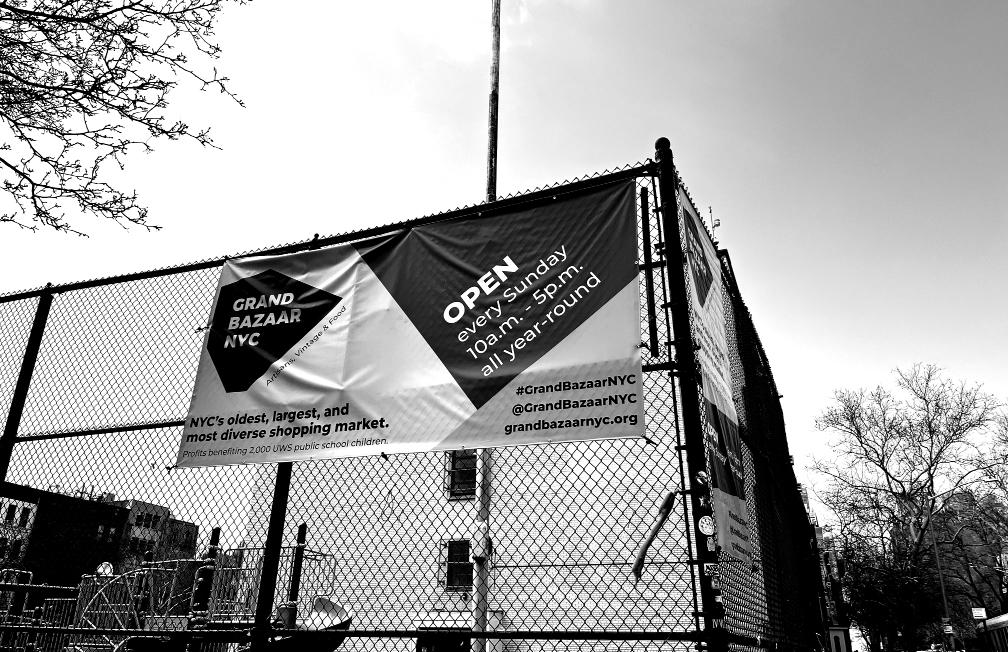
could find them anywhere else.”
Many of the vendors and their stalls feature unique tastes and curated inventory, intended to grab the attention of wandering shoppers, no matter their personal style or budget.
The Grand Bazaar NYC is a popular event for many reasons — buyers understand that the eccentric items and clothing they’re appreciating took hours to create or collect. It is clear this flea market has withstood the test of time and buyers can
see why. Not only are the vendors distinctive, fairly priced and locally based, but the flea market donates 100% of its profits to Parents Associations to benefit local public schools. The next time you find yourself near the American Museum of Natural History, take a moment to cross the street and shop from the vendors. This quirky flea market experience provides the opportunity to not only improve your wardrobe with beautiful creations from
local artisans and vendors, but to also give back to the community you live and go to school in.
The Grand Bazaar NYC opens every Sunday from 10 a.m. to 5 p.m with different exciting themes featured every week.
This Sunday, March 3, the market’s theme will feature “Sweet, Hot & Spicy’’ eatables. Vendors are encouraged to sell items in accordance with the theme, however, nothing is mandatory, so there is still something appealing for everyone.
‘Come and Get It’ Tackles Class and Consumerism On College Campuses
Kiley Reid’s sophomore novel addresses money and power at a southern college campus
By INSIYA GANDHI News Editor
For many young people, the American collegiate experience serves as an eye-opening window into class divides. Seemingly innocuous fundamentals of college life — such as dorm room decorations or “going-out” wardrobe choices to more serious undertakings like choosing housing accommodations — are revelatory of students’ varying financial statuses.
In her sophomore novel, “Come and Get It,” American author Kiley Reid explores both money and power, and how they impact those who have them, and those bereft of them, set against the backdrop of a large southern university in Arkansas.
Reid made waves in 2019 with her debut book “Such a Fun Age,” a witty and captivating read that also addressed race and class.
In “Come and Get It,” Reid hones in on young women and their relationships with money. The protagonist, Millie Cousins, is a 24-year-old resident assistant (RA) at Belgrade Hall, an upperclassmen, transfers and scholarships dormitory at the University of Arkansas in Fayetteville. Her prudent personal finance habits attract the admiration of Agatha Paul, the book’s other main subject.
Millie is diligent, financially independent from her parents and committed to her RA gig. Agatha, on the other hand, is a chic journalist from Chicago who recently ended a relationship with Robin, a dancer. The pair often argued about money and Robin’s seeming
financial dependence on her.
She then arrives in Fayetteville to study young southern women’s thoughts on weddings. Millie serves as the catalyst for Agatha to meet three college girls equipped with the irreverence, presumption and contrarian spirit of adolescence. When one of the interviewees, Jenna, wears a blanket over her head, she remarks that she resembles “a cute little refugee.”
As the conversation progresses, Agatha cares less about the women’s thoughts on weddings and more about their relationship with money. Jenna, who works in her dad’s orthodontist office, receives “practice paychecks” from him and earns her “fun money” (money for discretionary expenditures) from a job at alumni services. Agatha may not be fond of the women, but she sure does like listening to them.
So, Agatha shifts her focus from southern women and weddings, to a series for “Teen Vogue” profiling young college women and their approach to money. She does so with the help of Millie, who agrees to let Agatha listen in on the chitchat between the young women from her room for story material.
Reid drew inspiration from a study by Laura T. Hamilton and Elizabeth A. Armstrong titled “Paying for the Party: How College Maintains Inequality.” In the study, Hamilton and Armstrong chart the trajectories of a group of women at an unnamed “moderately selective” public Midwestern university who begin their college careers in the same dormitory first year, and end up with vastly different outcomes.
The study shows how socially
oriented students from financially sound backgrounds who can choose the “party pathway,” a route fastened in the Greek Life system and supported by administrators (due to the economic advantages they present), often see the most economically successful results.
The throughline between Hamilton and Armstrong’s study and Reid’s plotlines are explicit. Young women of differing socioeconomic backgrounds candidly, and sometimes brazenly, recount their thoughts on social status, class and college life to an academic researcher.
Reid is, at her core, a spectator. She is a master of biting one-liner descriptions, describing one character as resembling “a backpack.” Her realistic dialogue reveals interesting truths about young women and their consumerist patterns, whether it be Uber trips, indulging in brands such as La Croix and Birkenstock, or particularizations of dorm decorations like Himalayan salt lamps.
Her strengths lie in crafting well-meaning — yet deeply flawed — characters, some of whose actions make the reader want to dive into the text to grip and steer them in the opposite direction, while being simultaneously enchanted by the embarrassment their next move will create. Reid skillfully and nonjudgmentally introduces us to a diverse array of young women.
One of the novel’s most compelling and pitiable characters is Kennedy, a lonely transfer student from Iowa who shares a suite with Tyler and Peyton. After
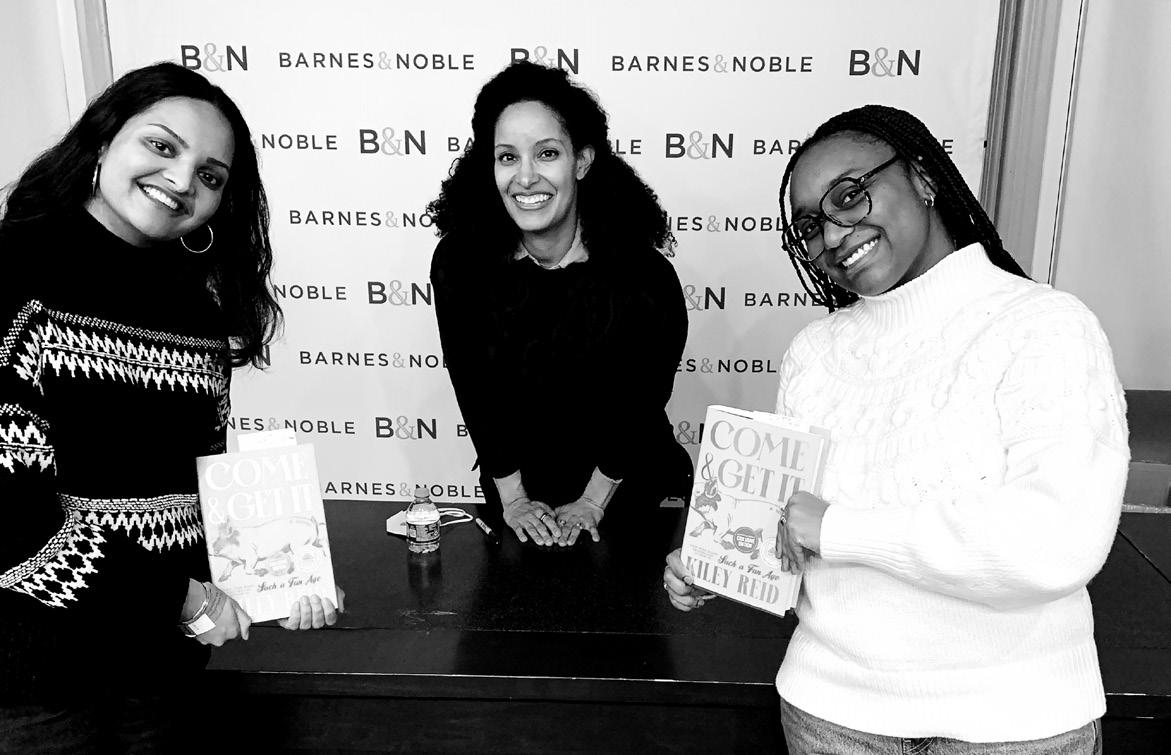
COURTESY OF INSIYA GANDHI
experiencing a traumatic incident at her previous school and being relegated to a social pariah, Kennedy is plagued by an overthinking mind that hinders her from integrating into campus life at Arkansas. Reid’s vivid descriptions of Kennedy’s internal thoughts make her one of the novel’s most sympathetic characters. Through masterful and realistic dialogue, Reid allows us to look past the lack of discernible plot devices in the book and instead lets us simmer in the lives of these complex, well-constructed characters.
Ultimately, the novel’s conclusion falls short of the build-up that Reid establishes. By attempting to neatly resolve each of the character’s faiths, she unintentionally glosses over major events instead
of engaging in a more realistic conclusion.
The novel succeeds in identifying and recognizing the financial gaps that higher-educational institutions perpetuate. She does so by highlighting the difference between students who casually discard money and travel by Uber across campus, versus the more financially prudent students, as well as bringing to light how access to money and financial wealth can affect individuals’ dispositions and confidence.
Reid doesn’t make any sweeping normative statements on American consumerism, rather, she details, with realism, empathy, compassion and some cringe, her character’s desire for and reliance on money in even the most minute ways.
TARA LENTELL/THE OBSERVER
The Grand Bazaar NYC is one of the oldest flea markets in New York City, first established in 1979
14 Arts & Culture February 29, 2024 THE OBSERVER www .fordhamobserver.com
Set at the University of Arkansas, Kiley Reid’s latest novel, “Come and Get It,” explores the experiences of young women living on campus and their relationships with money.
Subverting Oppression Through Zines
‘Copy Machine Manifestos: Artists Who Make Zines’ displays the ways esoteric art has influenced mainstream media
By HANNAH VENNING Staff Writer
As our lives become increasingly dominated by technology, the importance of tangible publications — ones that we can flip through, lend to friends, put up on our walls and stick in our journals — has never been greater. Zines are the perfect embodiment of this unique and wonderful experience— these works have evolved alongside alternative culture for
the past five decades. Although much of this remarkable history has been lost to time, an exhibit titled: “Copy Machine Manifestos: Artists Who Make Zines,” defies that erasure. Currently on display at the Brooklyn Museum until March 31, the collection comprises hundreds of zines, photographs, video recordings and essays sourced throughout North America, offering a never-before-seen compilation of this arcane art form.

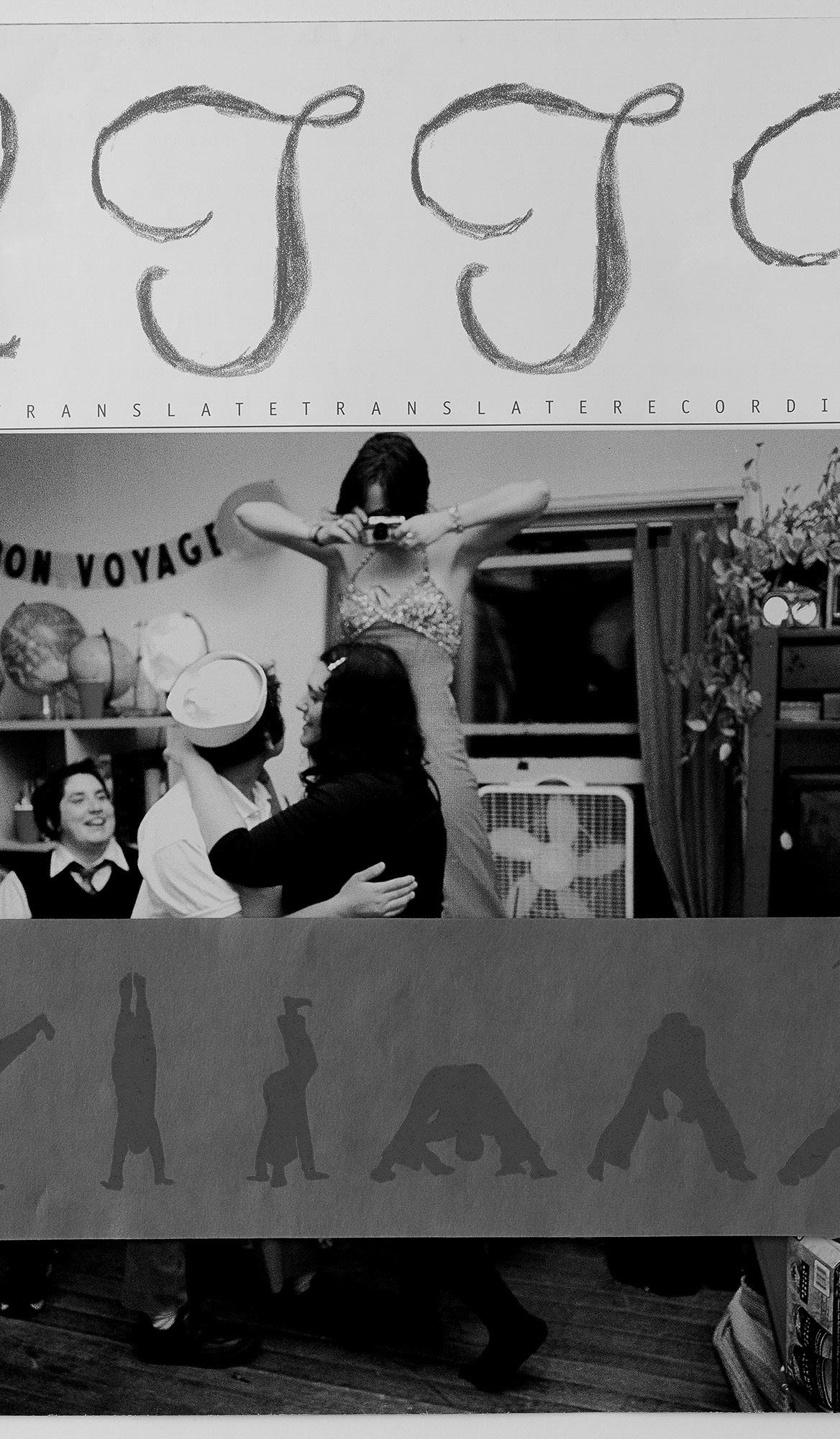
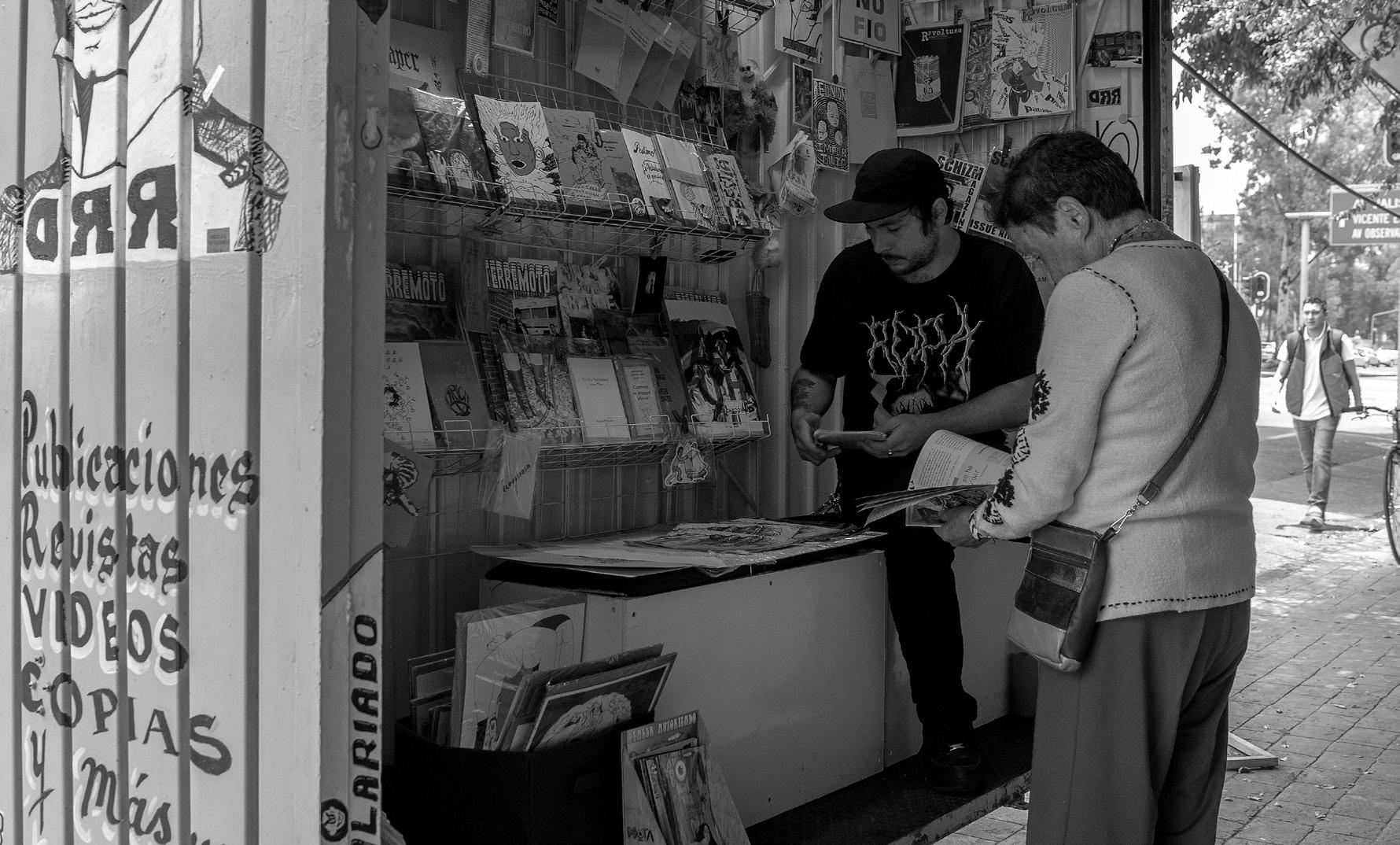
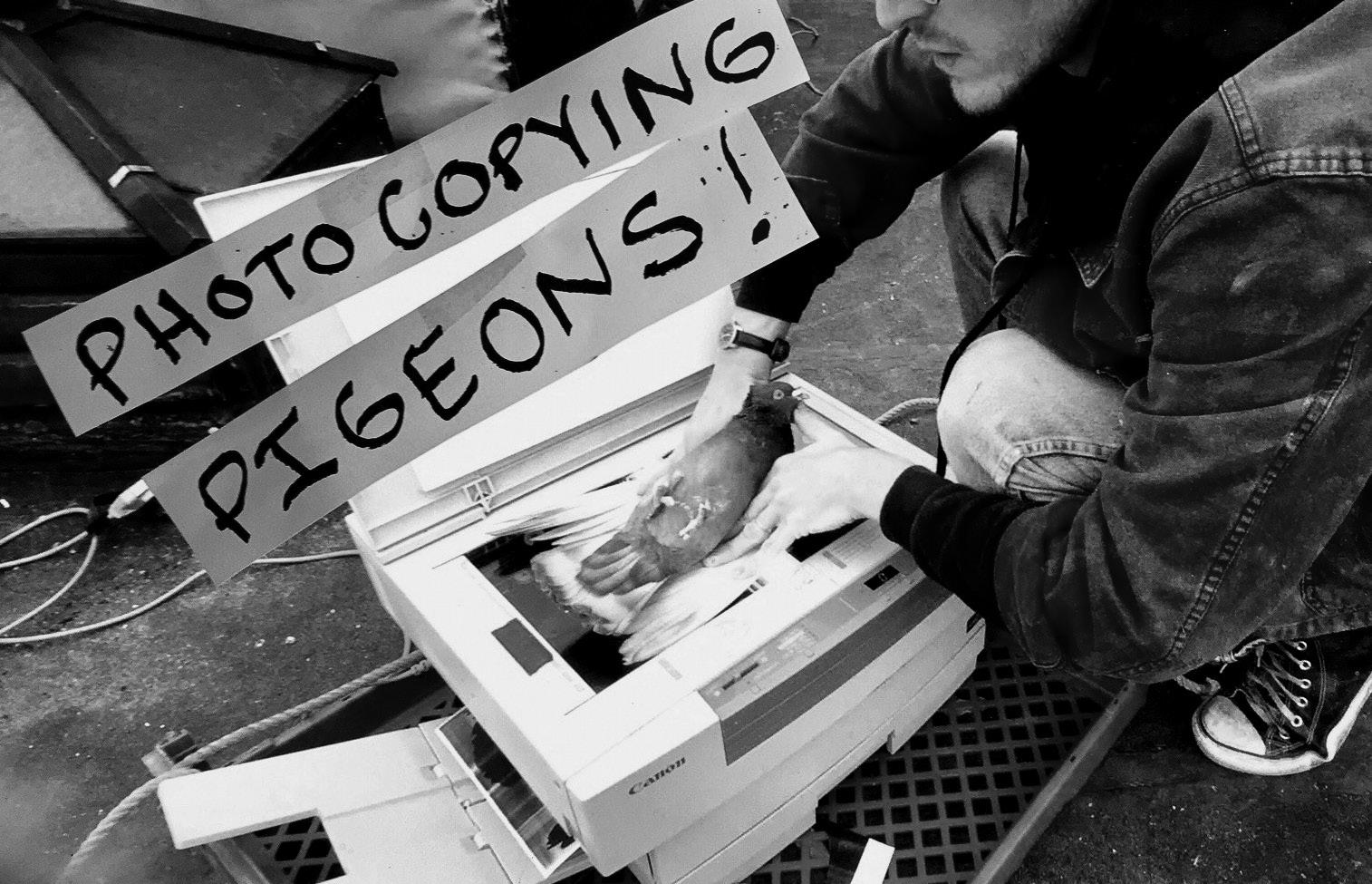
Short for “magazine” or “fanzine,” zines are independently produced magazines that emphasize the do-it-yourself aspect of creating and sharing art and writing, specifically that which fosters community and challenges systems of oppression. They are inherently accessible to make and share, allowing creators to display their work on an inexpensive and mass scale. First surfacing in the 1930s with the development of a rudimentary duplication machine called the mimeograph, zines rose in popularity four decades later with the advent of the photocopier.
This was a subculture defined by performance artists who commandeered and repurposed pop-culture imagery as a means of social commentary,
Various subcultures throughout North America such as queercore and punk have experimented with this medium as a means of expression, creating distinct, handmade art that has left a lasting effect on the creative world. Women’s joint demand for justice and liberation manifested into the riot grrrl scene in Olympia, Washington, which gave young girls a space to experiment with their femininity and combat the patriarchy. Unfortunately, due to the independent nature of these publications, many
of them have been lost to time while the rest have been scattered across the continent, leaving a bread-crumb path of subculture’s elusive histories.
In spite of these barriers, the Brooklyn Museum has managed to capture the essence of zine creation within a chronological and artfully curated exhibit that offers an enlightening experience for all who enter.
The exhibit opens with an exploration of the Correspondence Scene, which spanned from 1969 to 1980. This was a subculture defined by performance artists who commandeered and repurposed pop-culture imagery as a means of social commentary, and it was heavily inspired by the European avant-garde movement of the 1910s and the 1920s. While the scene was short-lived, it greatly influenced its successor: punk culture of the late 1970s.
The punk scene began with a focus on music and was centered on outrage and resistance. As it expanded, queer people began to carve out their own space within the scene, using zines as a means of depicting queer culture and homoerotic content in a way that could not be done in the mainstream at the time. This defiance and demand for respect and liberation resulted in the emergence of phrases such as “homocore” and “queercore,” which came to revise some of punk culture’s more exclusive and violent tropes. This was during a time when queer and trans people were actively suppressed and victimized, a reality upheld by corrupt authority and ignorance.
Through zines, queer and trans
communities were able to take a stand against this, loving and existing in the face of adversity, and channeling this tenderness and creativity into the greatest form of resistance. “Copy Machine Manifestos” also explores the ways women expressed their anger and dissatisfaction through the creation of zines toward the world and its inequalities. A notable example of this is Carolee Schneemann’s “Lebanon Series” from 1983. With a characteristically messy composition that reflects its creator’s condemnation of the destruction brought about by the Lebanon War, the series offers a feminist critique of such violence.
The exhibit also displays zines as a long-standing staple among communities of color, who have created art that explores oppression and the intersecting aspects of their identities. Abolitionist Neta Bomani creates work that beautifully explores themes of blackness, technology and identity through several projects on display, including selections from “100 Days of Zines” as well as “Dark Matter Objects.”
Ultimately, zines have historically given a voice to those who exist outside of the constraints of the mainstream, and The Brooklyn Museum provides viewers with a remarkable opportunity to be exposed to those voices which often go undiscovered and unappreciated. “Copy Machine
Manifestos: Artists Who Make Zines” offers an extensive and chronological walk through this vast, uncharted history, making it well worth the 45 minute train ride.
www .fordhamobserver.com THE OBSERVER February 29, 2024 Arts & Culture 15
COURTESY OF THE BROOKLYN MUSEUM
 un & ames
un & ames

Crossword: Jumping to Solutions

BY NAME
17. *Feb. 29, 1916: This ’50s TV show hostess is born (2 Wds.)
19. Fyre Festival lodging
1. One in charge
5. Emotion for a teen
10. Shrek, for one
14. Cathedral recess
15. Glee
16. Limo destination
20. Toilet, across the pond
21. It rocks?
22. Take ___ a compliment (2 Wds.)
23. Hump day animal
not a bird nor a plane celebrates his birthday
28. Chemistry lab necessity
30. Second gentleman’s first name, familiarly
31. Gives a hand
32. Flying bison with a palindromic name
35. Makeup mistake
38. Brother to Curly and Larry
39. *Quadrennial observance; or what each highlighted clue falls on (2 Wds.)
41. Genetic letters
42. Sect in Islam
44. Initials that indicate a summary
45. Twilight surname
46. Galactic cloud with a cutesy name
48. Cool tool for chipping? (2 Wds.)
50. *Feb. 29, 1940: This history-making achievement is earned by Hattie McDaniel for her role in “Gone With the Wind”
53. Wizards
54. Deadly showdown for Alexander Hamilton
55. Barking sound
56. Title for a knight
57. Sicilian volcano
58. *Feb. 29, 1692: This Salem proceeding’s first arrest warrants are issued (2 Wds.)
63. It’s proverbially more
64. Students moving off campus might be looking for one
65. Eyes, in some fanfiction
66. Bad day for Caesar in March
67. Lexapro and Citalopram, for two (Abbr.)
68. Garden invader
Down
1. Attractive, ironically
2. Name in nail polish
3. Digits you shouldn’t share, despite the name (Abbr.)
4. Landlubber’s lack (2 Wds.)
5. Playground retort (2 Wds.)
6. Medical research organization (Abbr.)
7. Baby Yoda, formally
8. Infection you might have gotten at the beginning of the semester
9. Like most crosswords, including this one
10. Peak
11. “Snubbed” director at this year’s Oscars (2 Wds.)
12. Saoirse, for one
13. Ambulance operators (Abbr.)
18. Courtney Love act
23. Studies for a test (if you’re like me)
24. ___ and sometimes Y
25. Was totally meaningless (3 Wds.)
26. March 17 honoree, for short (Abbr.)
27. Like some cheeks in winter
29. When doubled, it goes after a whip
33. Folks, in textspeak (Abbr.)
34. Contribute (2 Wds.)
36. Have ___ up one’s sleeve (2 Wds.)
37. Puts in order of preference
39. Italian predecessor to the Euro
40. Rainbow shape
43. Cause for celebration on a snow day (2 Wds.)
45. Eccentric Disney role for Depp
47. Fishes with a dragnet
49. Give off, as light
50. Removed from the closet against one’s will
51. Lucrative letters that complete co- or do-
52. Sundown meal during Ramadan
54. Locale for a BEC or Ice Spice
56. “___ the Man” (Amanda Bynes rom-com)
59. Long-running cop show on CBS
60. Fury
61. “Honest” president, familiarly
62. Trip letters
Across BY ABBY GRUNZINGER
BY HONORAH BROZIO

2 6 1 7 3 2 4 1 2 6 4 1 9 3 7 2 3 5 6 6 9 3 2 8 5 7 1 4 3 6 1 4 2 8 7 9 3 4 5 9 8 3 9 1 3 5 6
GRAPHICS BY GIADA EVANGELISTA
26. *Feb. 29: This hero who’s Instructions: Each row, column and 3×3 box must contain the numbers 1-9 exactly once.
Sudoku
Rams Create: The Comic Section
Fun & Games Editor Abby Grunzinger February 29, 2024 THE OBSERVER






































 HONORAH BROZIO Contributing Writer
HONORAH BROZIO Contributing Writer




 WILLIAM LEE Contributing Writer
WILLIAM LEE Contributing Writer









 un & ames
un & ames


